

Preparing for Sixth Form
ACADEMIC 2025 HIGHLIGHTS
ACADEMIC SUPPORT SESSIONS EACH WEEK OF BTEC’S ACHIEVED GRADE A*-A EQUIVALENT CO-CURRICULAR OPPORTUNITIES OF ART PUPILS ACHIEVED A*-B AT A-LEVEL
A*-B AT A-LEVEL
DIFFERENT SPECIES WITHIN OUR ONSITE ZOO OF ECONOMICS PUPILS ATTAINED A*-B AT A-LEVEL OF GCSE RESULTS ATTAINED GRADES 9-7 81% 103 87% 191 100% 29 100% 86% 70 94% 45% INTO FIRST CHOICE UNIVERSITIES GCSE PUPILS WITH AT LEAST FIVE 9-7’s GRADES OF PUPILS ACHEIVED GRADE 9 IN CHEMISTRY & PHYSICS AT GCSE OF PUPILS ACHEIVED GRADE 9-7 IN ART 92% 57 41% 74%
ACADEMIC ENRICHMENT ACTIVITIES OF GRADES AWARDED A*-A EQUIVALENT IN BTEC PSYCHOLOGY & PERFORMING ARTS OF BIOLOGY PUPILS ATTAINED A*-B AT A-LEVEL
Welcome
Welcome to the Sixth Form!
Joining the Sixth Form at Bede’s is incredibly exciting; whether you are new to the school or returning after your GCSEs, you are entering a new phase of education and an entirely different area of the school, with its own unique opportunities, expectations, and freedoms.

Sixth Formers at Bede’s embody our school values in everything they do, and the programme we put together for them enables them to develop in this way too. Our study programme is designed with each pupil’s strengths in mind, creating a bespoke and tailored timetable. All Sixth Formers take three activities; some of these may be study activities, but we feel strongly that between 16 and 18 the importance of building social bonds, developing hobbies and interests, and honing skills outside the classroom is non-negotiable. We take pride in the way every Sixth Form pupil is fully involved in school life.
Now that you are part of the Sixth Form, the onus is on you to take charge of your academic studies. At Bede’s, the academic support systems mean you will never be alone in this, but it is vital that you take ownership of your academic success. You should also take an interest in shaping school life and having your say – pupil leadership is a privilege of the Sixth Form, something that is earned and indicative of our open culture.
This booklet is designed to help you make the transition from GCSEs to Sixth Form study as smoothly as possible. Inside, you will find information about preparing for Sixth Form study academically. These activities are not course material, but they will prepare you for the kind of work you will undertake when you begin and will help you adjust to the new level of expectation.
Later in this booklet, there is information about Sixth Form life, expectations, privileges, and advice on how to become an independent learner. You will also find guidance about elective qualifications and how to select one as an option.
Inevitably, you will have questions, ideas, and sometimes problems during your time in the Sixth Form. If you ever need to discuss anything with us, you can find the Sixth Form team in the office at the back of the Sixth Form Centre. My role is to oversee everything that happens in the Sixth Form. Miss Jackson is the Head of Year for the incoming Lower Sixth and will be your go-to person for day-to-day queries. Mr Adlam is the Head of Year for Upper Sixth primarily, but he will also be well placed to help you with queries about courses and future plans. Mrs Franks is our Head of UCAS and Careers and an expert on advising pupils about their next steps; she is located in the Junior Head of Year office.
You are about to commence the most exciting, freeing, and engaging stage of your educational life to date – and we are incredibly excited to welcome you into Bede’s Sixth Form.
Justin Sealey Head of Sixth Form
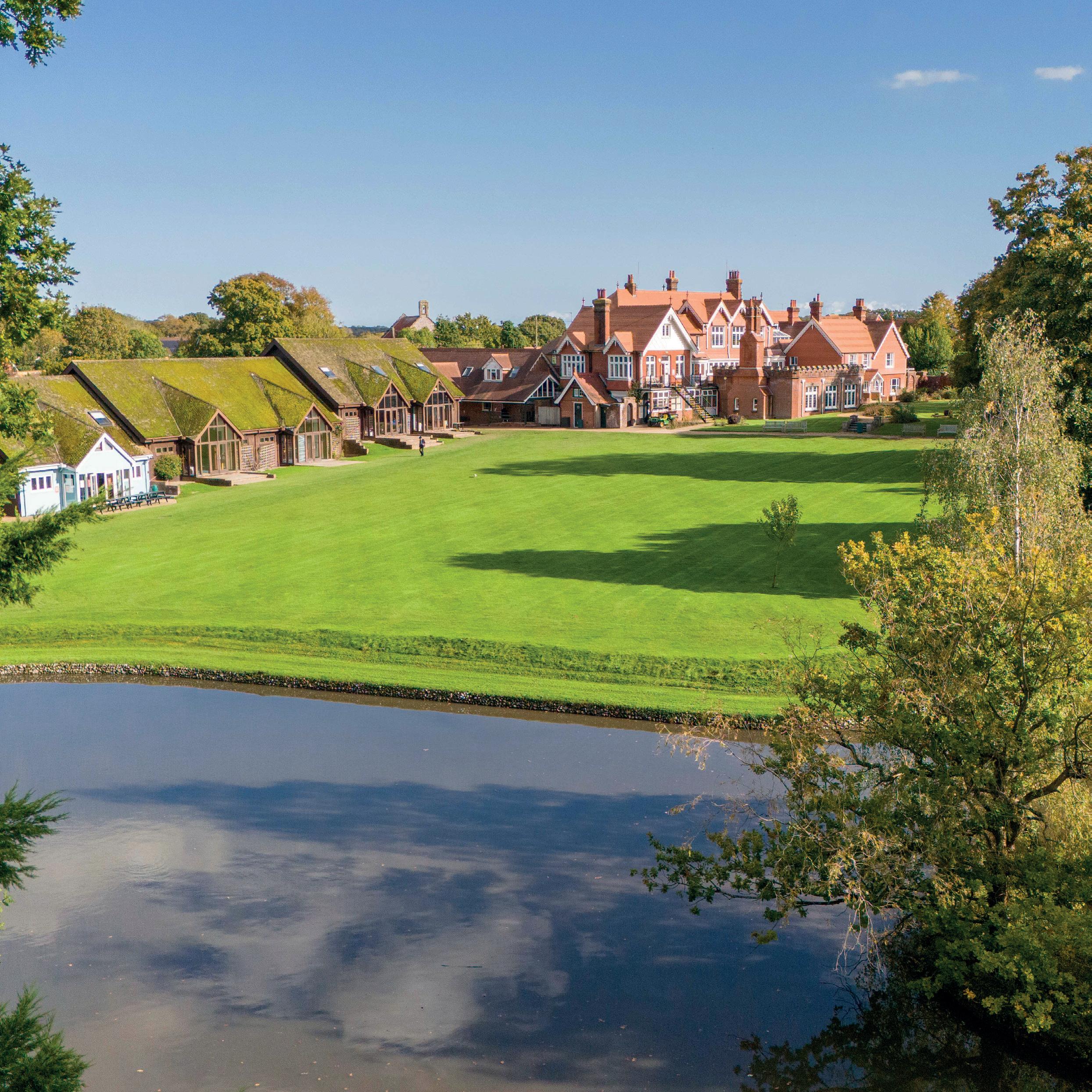
Our Vision
Where every child finds joy in their pursuit of brilliance
Our Mission
We continue to craft a more joyful education.
Cultivating a vibrant learning experience, motivating us to pursue our individual best.
Providing a festival of opportunity, enabling us to discover new passions and develop new talents.
Building a kind-hearted community, inspiring us to enhance the lives of others.
Our Values
Be Compassionate
Because a caring community fosters belonging.
We expect our community to show kindness to people of all ages, genders and ethnicities, maintaining campuses where every person feels joyful and energised.
Be Courageous
Because fortune favours the brave.
We challenge our community to stand up for what is right, providing them with a safe environment where they can take bold action in pursuit of brilliance.
Be Curious
Because wisdom can be found off the beaten track.
We encourage our community to discover unlikely passions and hidden niches, releasing them into a wealth of opportunities inside and outside the classroom.
Be Conscientious
Because dedication is a spearhead of success.
We ask our community to throw themselves wholeheartedly into every endeavour, taking responsibility for their journey and inspiring others to do the same.

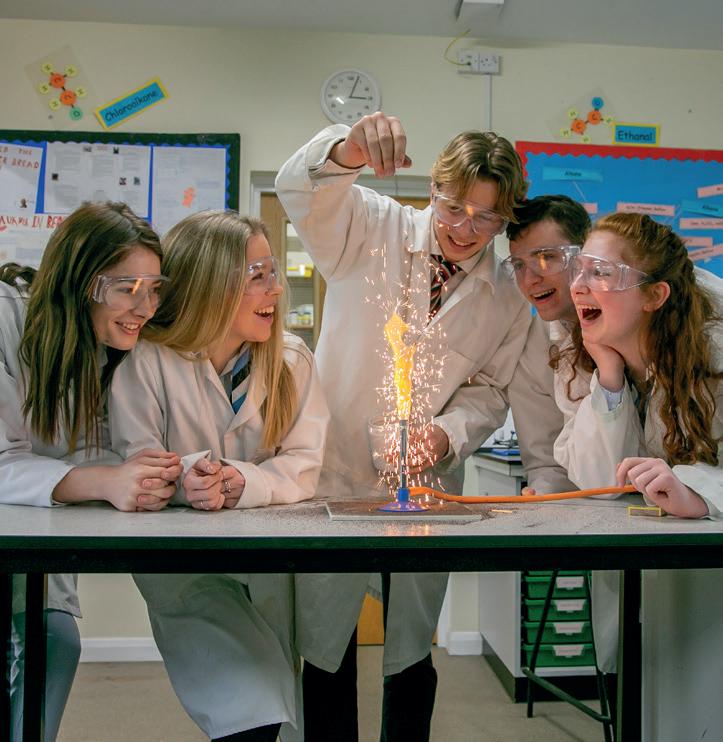
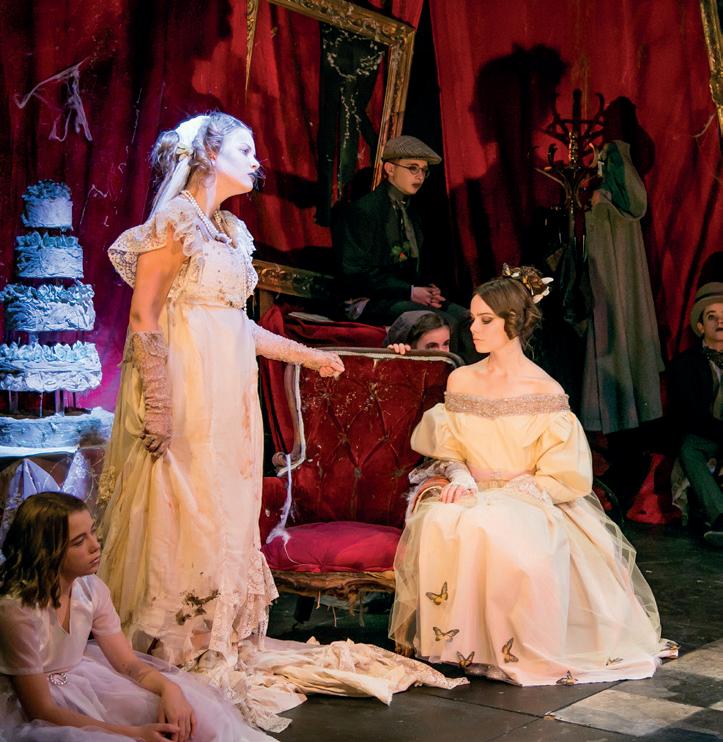
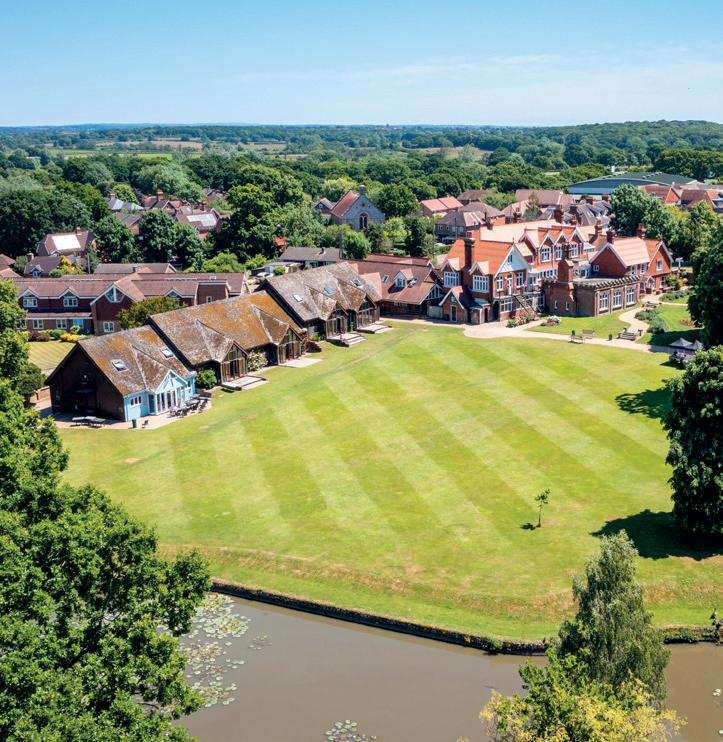

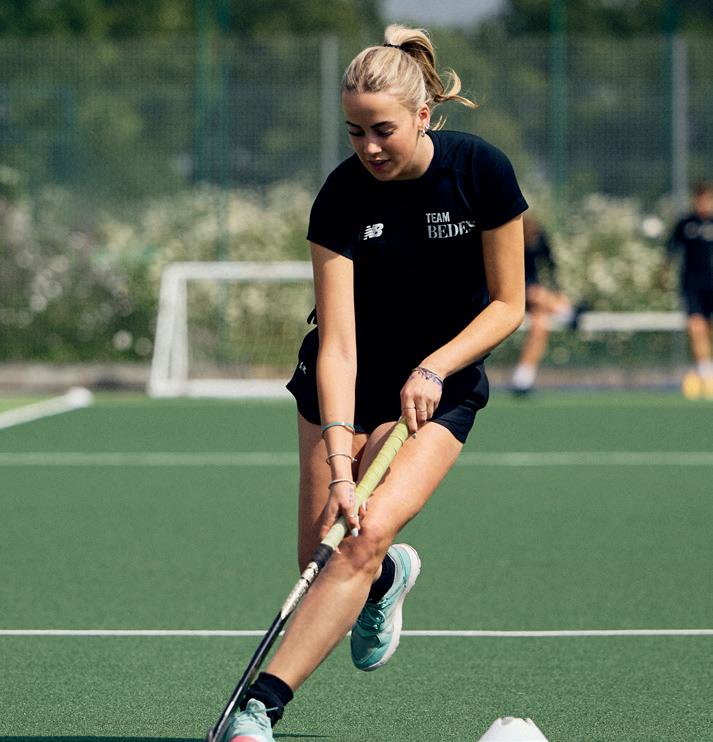
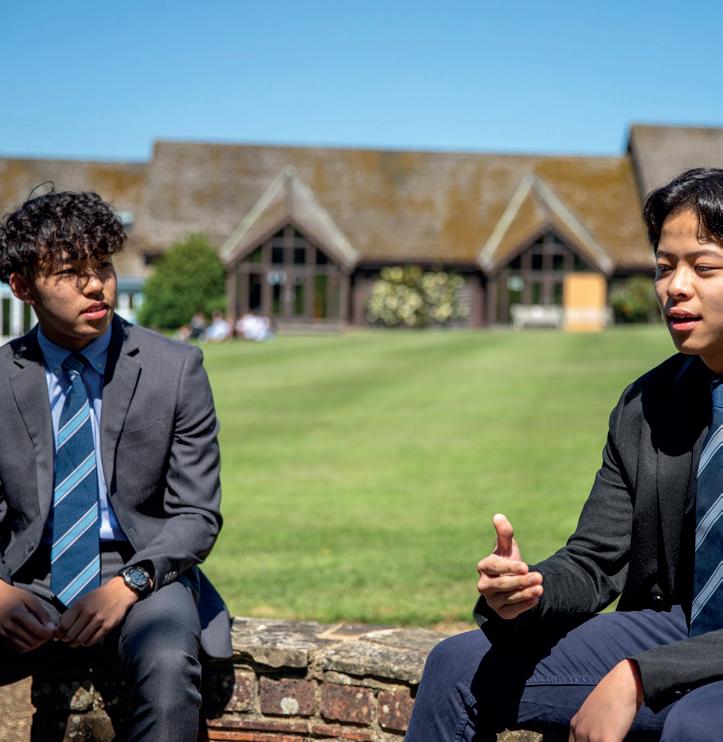

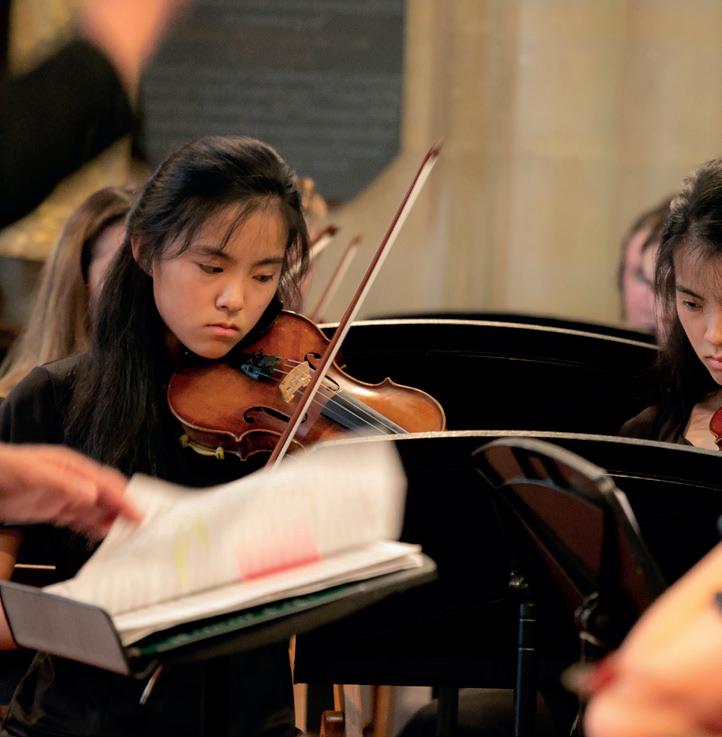
The Sixth Form Centre
The Sixth Form Centre is your space – a modern, peaceful hub for Sixth Formers, away from houses and the junior years. It is a place where you can get on with your work during the day and socialise at breaks and lunchtimes. The Centre has a small kitchenette and fridge, a range of seating options with charging points, and a noticeboard with up-todate Sixth Form information. At the back you will find the offices of the Sixth Form Team, who supervise the space and are available if you need help or advice –just knock if the sign says “available”!
The Sixth Form Centre is open from 08:00–19:40 every day. During lesson times, it is used as a quiet working space; group work is welcome as long as it is kept low-key, while silent study is reserved for the Library. At breaks and lunchtimes, the Centre becomes the Sixth Form common room.
In the evenings, Sixth Form staff run open prep sessions where you can work, get help with university applications, or seek advice from your Heads of Year. At weekends, the space is also open in the mornings for study. If you have an idea for an event, the Centre can be used to host it – in recent years, games nights and quizzes have been very successful here.
The Sixth Form Centre belongs to the Sixth Form community. We all respect the space and use it thoughtfully, ensuring it remains a focused, welcoming environment for all Sixth Form pupils.


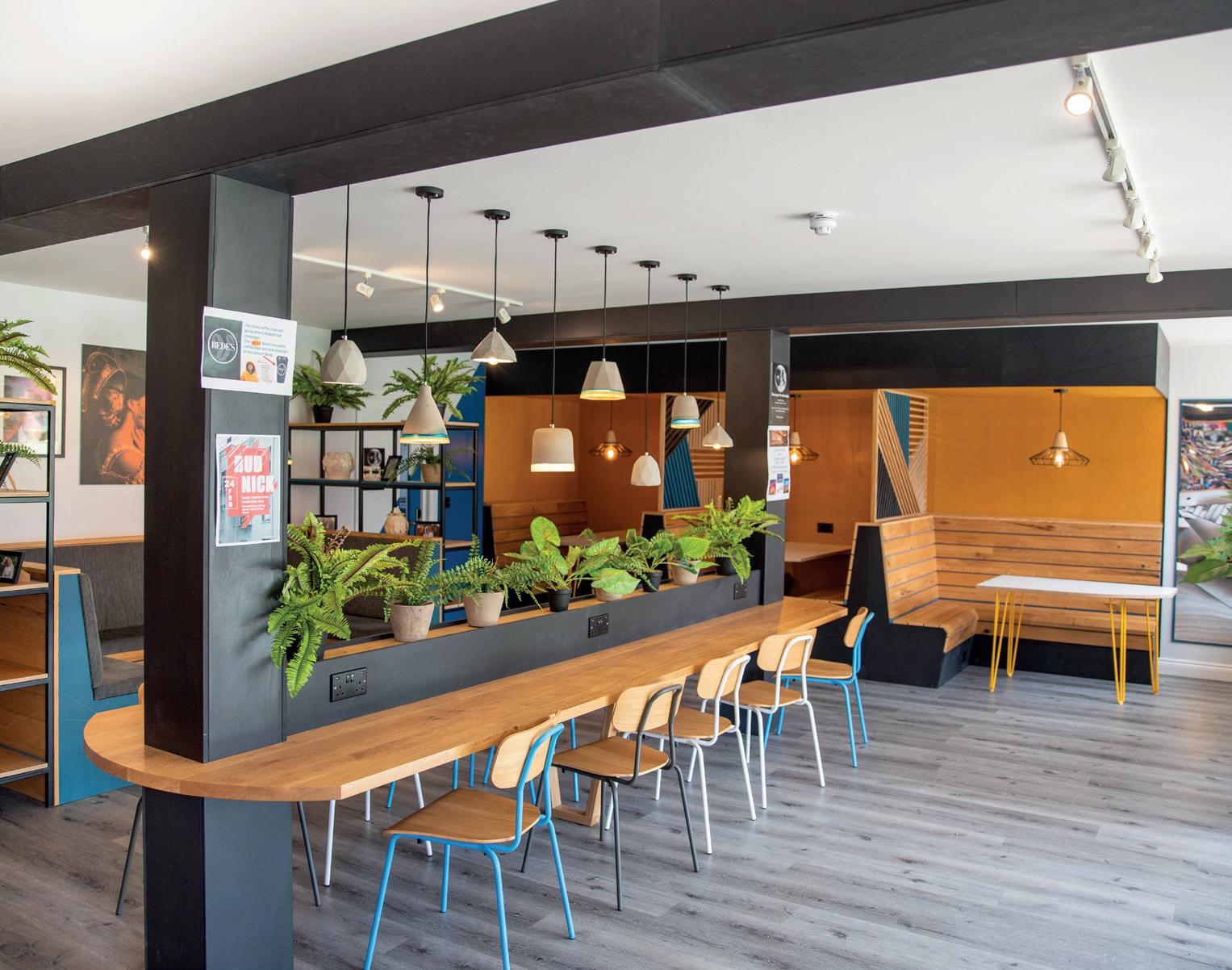
Independent Study Techniques
One of the most significant and rewarding changes you will experience in the Sixth Form is the shift towards independent study. This is a core part of your new curriculum and a skill that will be vital for success here and in your future. You will find that your timetable now includes periods of non-contact time where you are not in a scheduled lesson. This time is a valuable resource, and it is your responsibility to use it effectively to support your academic progress.
What Does Independent Study Look Like?
As you progress through the Sixth Form, the workload set by your teachers outside of lessons will increase. Independent study is about more than just completing homework; it’s your opportunity to take control of your learning. Effective use of this time might include:
• Consolidating Knowledge: Completing essays, working through timed questions, practising a specific skill, or reviewing your notes from a recent lesson.
• Preparing for What’s Next: Reading ahead in a textbook or looking over materials for your next lesson to ensure you arrive prepared and ready to engage.
• Exploring Your Subjects & Preparing for Your Future: Diving deeper into topics that interest you through wider reading and research is vital for life beyond Bede's. For those aiming for university, demonstrating a genuine passion and a habit of independent exploration is exactly what admissions tutors look for; it shows you are ready to thrive when you specialise. For those considering apprenticeships, this same curiosity and interest in the world of work demonstrates to employers that you are an engaged and motivated candidate. This wider enrichment is absolutely vital to presenting yourself as the best possible candidate, whatever your chosen pathway.
• Developing Specialist Skills: Using your non-contact time to work within a department. This could mean using the DT workshop, practising in a rehearsal room, or developing your portfolio in the Art studio or Media suite.
Developing Independent Study Skills
Throughout your GCSE revision, you will have discovered that different techniques work better for different subjects, and you have likely developed your own preferred methods of working. While many of these skills will translate directly to the Sixth Form, you also need to consider the new modes of assessment that accompany your new courses.
This is a chance for rediscovery—a process of working out which skills and knowledge are being developed in each subject, and therefore which study techniques best suit the various parts of each course. A key part of your independent study time is therefore about actively refining your methods to meet the specific demands of the courses you have chosen. The revision skills you already have—such as blurting, creating mind maps and flashcards, and working through past papers—are your starting point, but now is the time to adapt and evolve them.
Supervised Study in the Lower Sixth
To help you manage this new way of working and build a strong weekly routine, all Lower Sixth pupils have a supervised independent study period timetabled in the Library each week. You will be registered by a member of staff, who will supervise the session. Of course, while this formal session is once a week, you are always welcome to use the Library as a place for quiet, private study if you find this helps you to focus on your work.
This timetabled time is specifically ‘ring-fenced’ for you to focus on your independent work without distraction. It provides structure and support, helping you to develop the self-discipline and organisational skills that are the hallmark of a successful Sixth Form pupil and a well-rounded, independent learner.
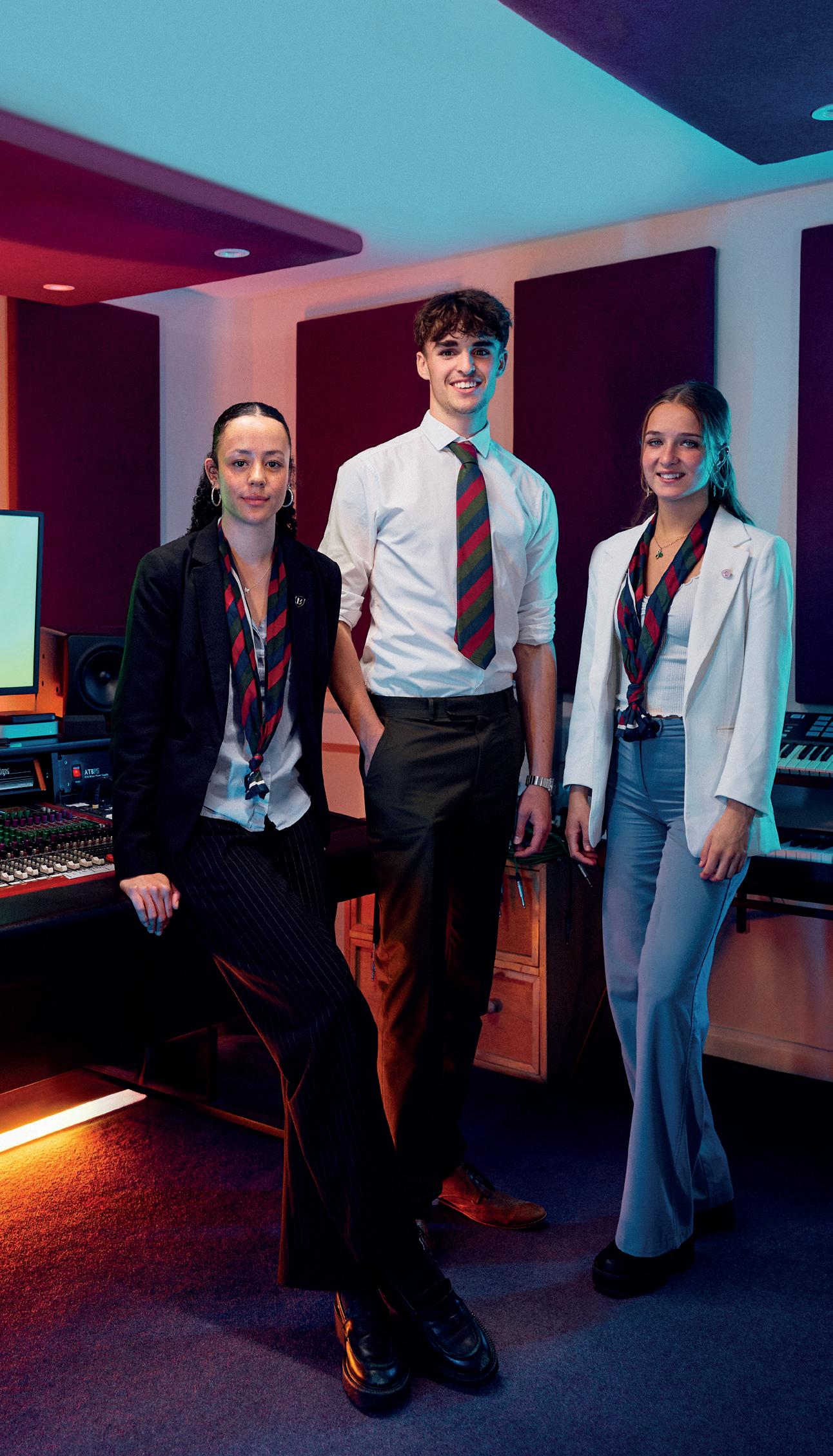


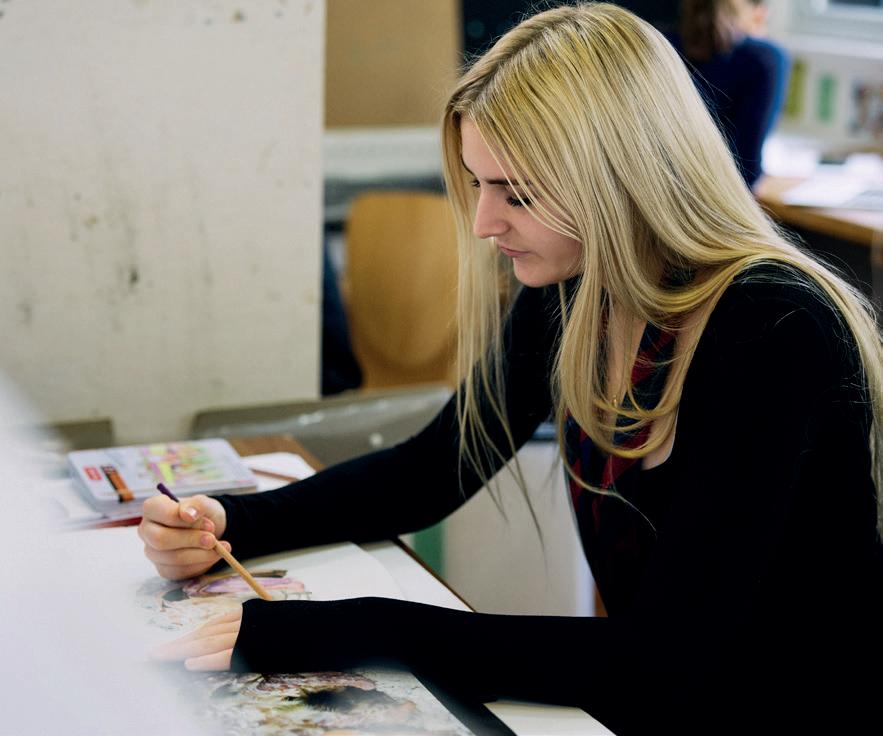

Expectations & Privileges of being a Sixth Former
At Bede’s, the values of compassion, courage, conscientiousness and curiosity underpin everything we do. These four C’s become even more important in the Sixth Form, as they are the values we want you to take with you into the wider world.
All Bede’s Sixth Formers are expected to play an active role in school life. They work hard and manage their workloads independently, with support from their teachers; they take part fully in the activity programme; they dress smartly and with pride, representing the school and its values; and, most importantly, they act as role models to younger year groups.
With these expectations come privileges. Although pupils are expected to look smart, the uniform policy allows greater flexibility in the Sixth Form, with “shoulds” and “coulds” included to give space for personal expression.
Your timetable will include study periods. These are vital for keeping on top of your academic work, but you may also plan your time to use the gym, visit the village shop, or meet friends in the Sixth Form Centre. The gym is also open at lunchtimes for those who wish to make use of it.
The Sixth Form at Bede’s is a community – and that means socialising as well as studying. Each year group enjoys socials, which pupils are encouraged to organise around their own interests. In the past these have included casino nights, quiz nights, karaoke, bingo, and music evenings. If you have an idea, the Sixth Form Engagement Committee is there to help make it happen.

Bede’s Diploma Options
Being in the Sixth Form means becoming the leaders of the school – a role that carries both expectations and privileges.
At Bede’s, the values of compassion, courage, conscientiousness and curiosity underpin everything we do. These four C’s become even more important in the Sixth Form, as they are the values we want you to take with you into the wider world.
All Bede’s Sixth Formers are expected to play an active role in school life. They work hard and manage their workloads independently, with support from their teachers; they take part fully in the activity programme; they dress smartly and with pride, representing the school and its values; and, most importantly, they act as role models to younger year groups.
With these expectations come privileges. Although pupils are expected to look smart, the uniform policy allows greater flexibility in the Sixth Form, with “shoulds” and “coulds” included to give space for personal expression.
Your timetable will include study periods. These are vital for keeping on top of your academic work, but you may also plan your time to use the gym, visit the village shop, or meet friends in the Sixth Form Centre. The gym is also open at lunchtimes for those who wish to make use of it.
The Sixth Form at Bede’s is a community – and that means socialising as well as studying. Each year group enjoys socials, which pupils are encouraged to organise around their own interests. In the past these have included casino nights, quiz nights, karaoke, bingo, and music evenings. If you have an idea, the Sixth Form Engagement Committee is there to help make it happen.
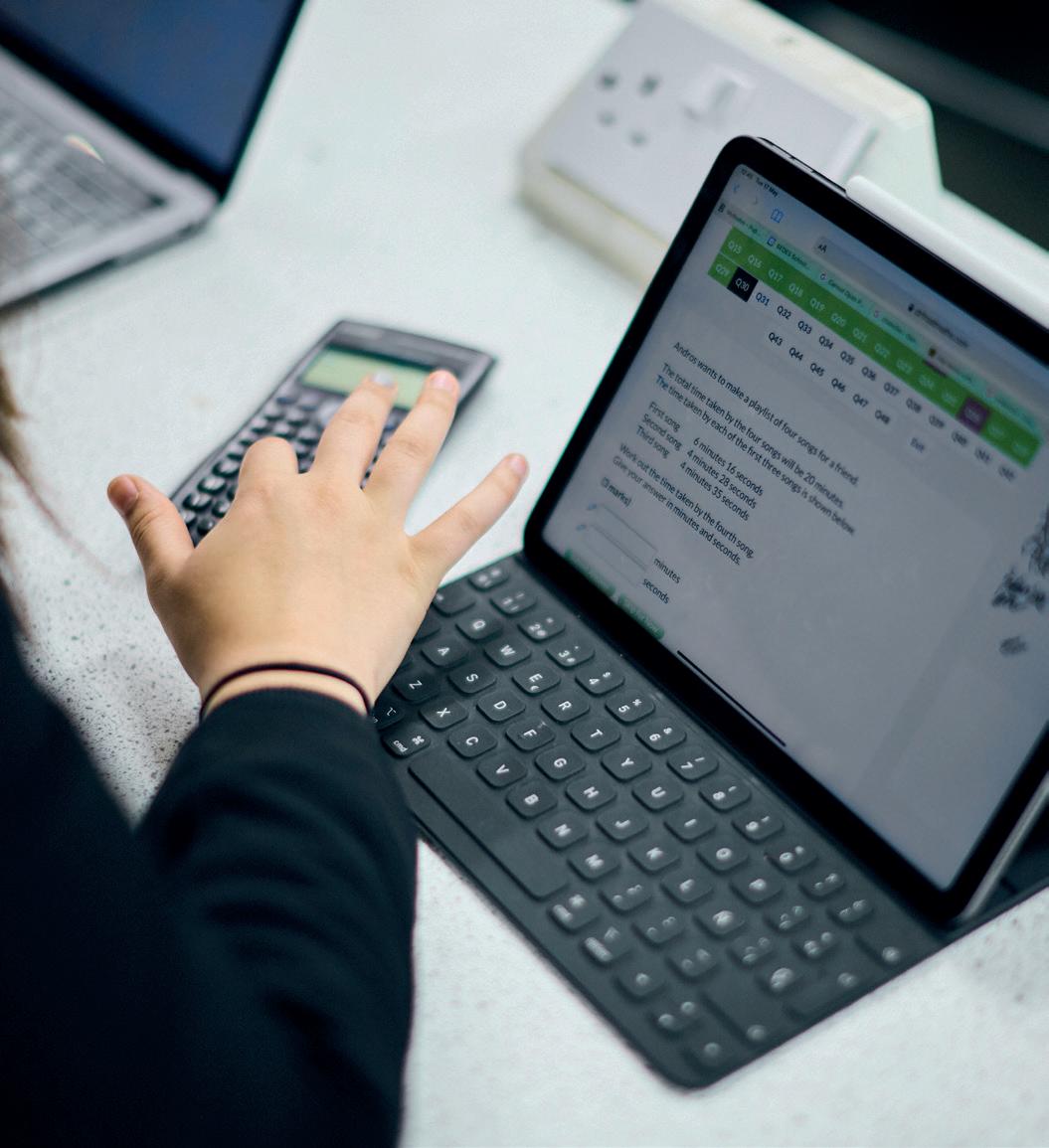
Elective Qualification Options
Whilst the Bede’s Diploma is designed to help pupils develop as well-rounded individuals with a broad range of soft skills, we also know that, as a Sixth Former, you may want the opportunity to push yourself further in a specific field.
We offer three main “extra” qualifications which fit alongside your three A Levels or BTECs within the timetable. These are available if you do not already have an additional commitment – for example, some pupils study four subjects, take part in a Sports Academy, dance with Legat, or pursue qualifications such as Further Maths, EAL or IT BTEC, which require additional lessons.
If this is not the case for you, and you would like the chance to gain extra UCAS points and complete a qualification that will enhance your university application while also developing key skills, then one of the following may be of interest:
Extended Project Qualification (EPQ)
The EPQ is a Level 3 qualification worth UCAS points – the equivalent of half an A Level. For example, a grade A is worth 24 points. Over the course of the Lower Sixth, you will complete an academic-focused project in which you set your own question, research it in depth, analyse and evaluate your findings, and reflect on the process. Your project can take the form of a traditional dissertation, or an artefact, film, or event. At the end, you will present your work for assessment. Pupils have two timetabled lessons a week with their EPQ supervisor.
Sports Leaders Qualification (SLQ)
The SLQ is a Level 3 qualification worth 16 UCAS points. Like the EPQ, it requires commitment across the year, but here the focus is on developing leadership, communication and problem-solving skills within sport. Pupils have the opportunity to plan and deliver coaching sessions and events for primary school pupils, while gaining valuable experience in organisation and leadership. This course is particularly suitable for those interested in leadership roles or in pursuing coaching careers within sport. Pupils have two timetabled lessons a week in the SLQ.
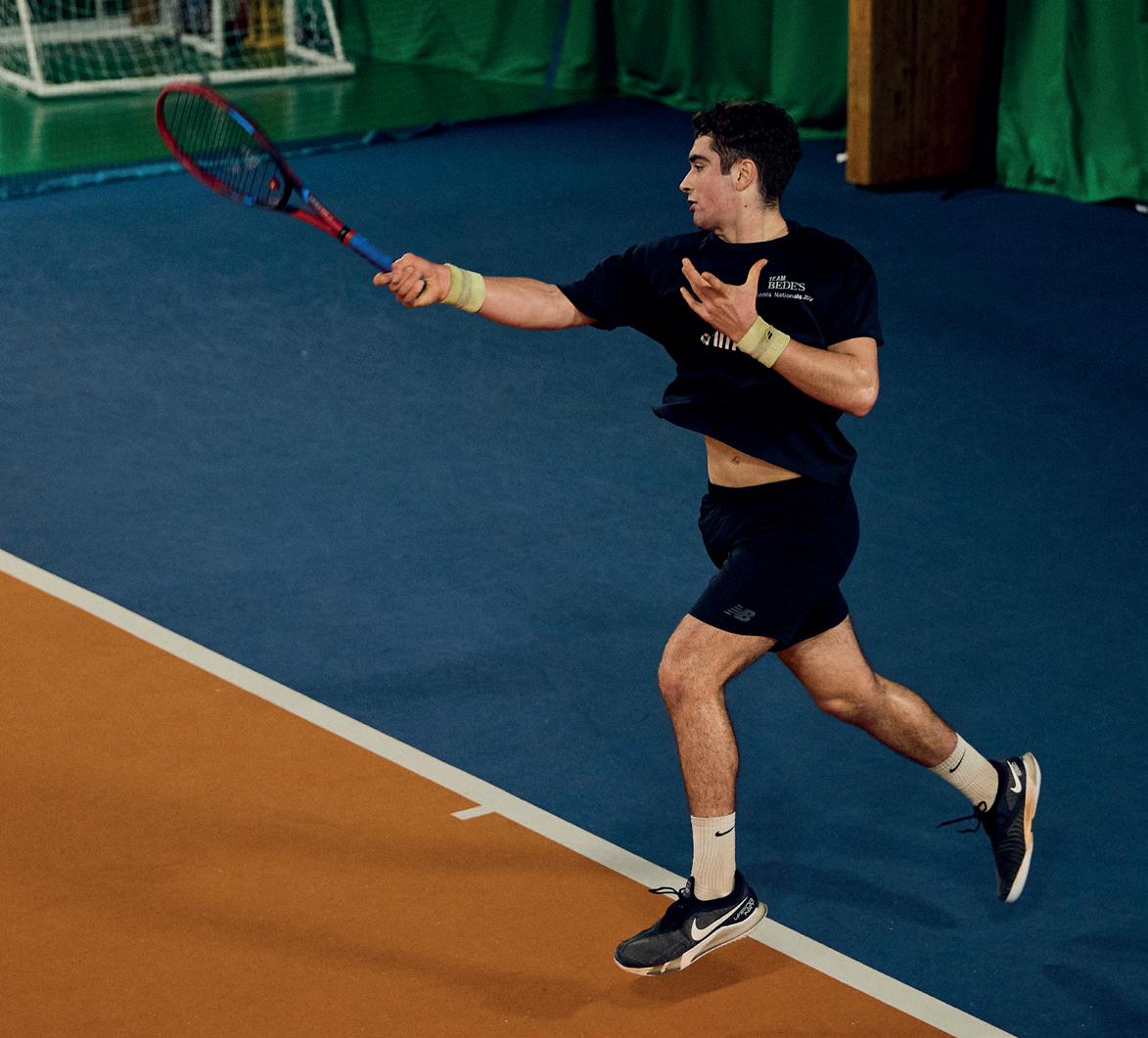
Arts Award (Gold)
The Gold Arts Award is a Level 3 qualification worth 16 UCAS points. It is aimed at pupils with particular strengths in Visual Arts, Performing Arts or Music, who wish to develop their practice while building skills in leadership and communication. The course involves extending your own arts practice, leading an arts project, investigating current issues in the arts, and engaging with the professional arts world. Across the year, pupils organise and run events and sessions in their chosen discipline, developing both their own artistic work and their ability to lead others. Pupils have two timetabled lessons a week in the Lower Sixth.
Choosing an elective
If you would like to take one of these qualifications, you must let us know before the start of the year. Please look out for an email from us with a Google Form to submit your request – the sooner you can get started, the better!

Timeline throughout the year
Lower Sixth
Autumn 1:
Induction and team-building
Friday 10th October - final deadline for changing courses
L6th social Assessments
Autumn 2:
Life skills training
Spring 2:
Start of UCAS / apprenticeship research
Summer 2:
May/June - AS exams for some subjects
June - End of year internal exams
June - Futures Week
Upper Sixth
Autumn 1:
UCAS personal statements and applications
30th September - internal deadline for Oxbridge and Medicine applications
15th October - deadline for Oxbridge and Medicine applications
Autumn 2:
U6th social Spring 1:
14th January - equal consideration deadline for majority of undergraduate courses
February - Mock exams
May/June - A-level exams
Applying for University, including international
Your Future Starts Here: Navigating Your Path
After Bede's
Planning for life after Sixth Form is a core part of your journey at Bede’s, and the Careers and University Applications Service is here to guide you every step of the way. Working hand-in-hand with the Sixth Form Team, we're dedicated to helping you discover and achieve your aspirations, whether that's higher education, a specialist institution, international study or an apprenticeship.
Lower Sixth: Laying the Foundations
Your future planning begins early in the Lower Sixth. We'll help you explore your academic plans and career aspirations, supporting you in your independent research to find the courses and universities that are the perfect fit for you. Alongside your tutor, the support on offer includes:
• Early Research: Guiding you through initial exploration of course and destination options, university rankings and competitiveness, in line with your motivations.
• Super-Curricular Enrichment: We can help you find opportunities to strengthen your applications and make them as competitive as possible
• UCAS Application Walkthrough: From the spring term onwards, we'll walk you through every stage of the university application process, covering rankings and entry requirements. You'll officially start your application in the summer term, with step-by-step support from us and your tutor, ensuring you meet both internal and national deadlines
• Futures Days: Preparing you for the exciting opportunities that lie beyond Bede's through a wide range academic taster lectures, course overviews, gap years, industry insights and life skill workshops, along with a half day workshop to your personal statement
• Admissions Test Support: If your chosen courses require admissions tests, we can provide assistance in the pratrion for and booking of these tests.
Upper Sixth: Finalising Your Choices and Beyond
As you enter into the Upper Sixth, with your subject predicted grades confirmed, we'll help you refine your university choices. Our aim is to ensure your selections are appropriate, aspirational, and realistic, maximising your potential for receiving offers. You’ll also receive support and guidance across the school to craft and refine a compelling personal statement. Before your application is sent to UCAS, we'll support you with a thorough review to ensure everything is as it should be whether that be the application form, your personal statement or your university choices. We can also liaise with universities and UCAS on your behalf.
Exploring Other Pathways: International Study and Apprenticeships
Your options at Bede’s also extend beyond traditional university routes in the UK:
• International Applications: Many pupils choose to study abroad, either returning to their home country or pursuing opportunities internationally. We provide guidance and spoke for these bespoke applications, timelines and processes.
• Apprenticeships: Each year, Bede's pupils successfully secure apprenticeships. In the Lower 6th, we offer bespoke support for this pathway, designed to maximise your chances of success. In the Lower 6th, support can include personalised action plans with regular review meetings, CV support and guidance for early research into potential employers and opportunities. In the Upper 6th, we then also offer support with applications, preparing for aptitude tests for assessment centres, and both online and in-person interviews.
Applying for University Timeline
LOWER SIXTH
Introduction to the Careers and University Applications Service
Able to book 1-1 appointments to explore early progression plans
University research - courses, entry requirements rankings, booking open days
Super curricular and vocational enrichment research and planning
UCAS Discovery Event
Planning for Open days
UCAS Applications started Apprenticeship Action Plans commence
Futures Day 1- university seminars and taster lectures and alternative pathway workshops
Futures Day 3- Personal Statement writing workshop and next steps action planning
International university application planning support
Futures Day 2- Life Skills Development Day
University Admissions Tests Booked
Summer enrichment experiences
UPPER SIXTH
First full draft of Personal Statement submitted & refined
Teacher references written
Early UCAS deadline for Oxbridge and Medicine Applications
UCAS personal statement finalised
International Applications
Predicted grades confirmed
University choices confirmed
UCAS References and predicted grades finalised
Final drafts of Personal Statement completed
UCAS applications submitted
Final UCAS applications submitted
Deadline for universities to confirm offers to pupils
Apply for Student Finance and DSA
Support with deferring offers
Booking University Accommodation
Results day support with university confirmations and the clearing process
Confirm final firm and insurance UCAS Offers
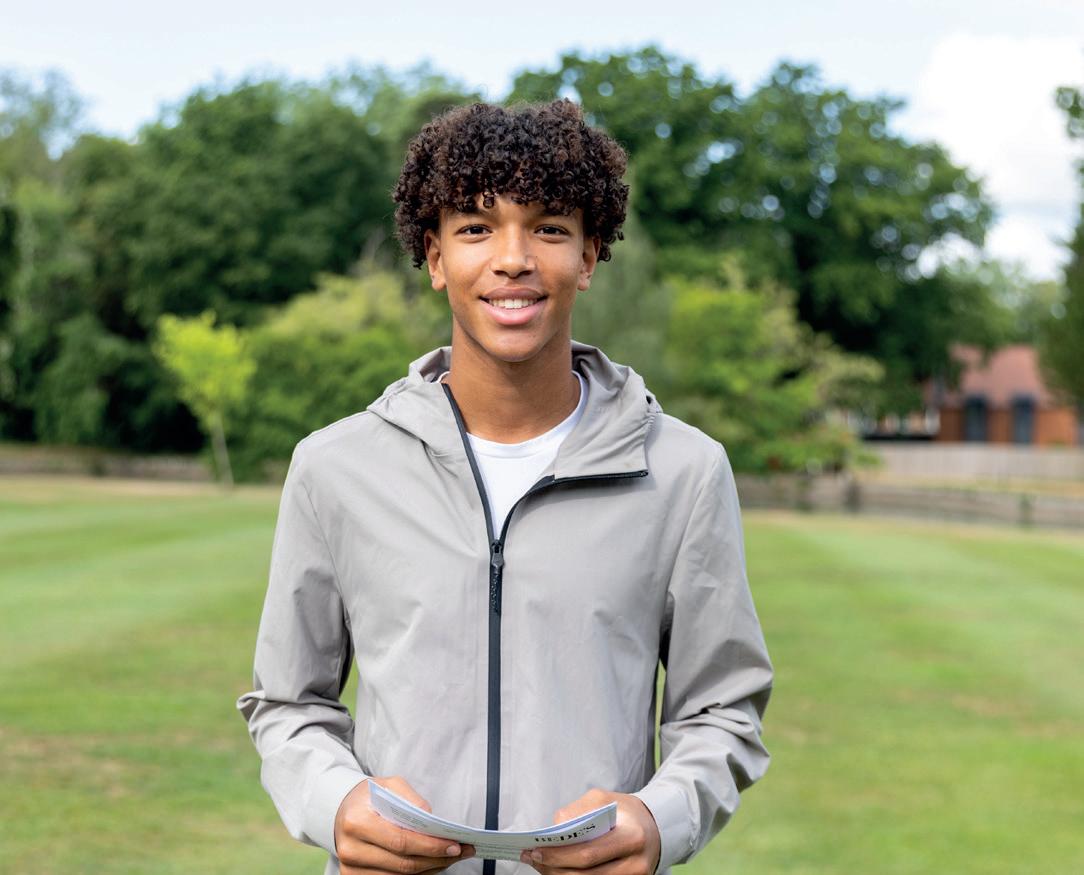
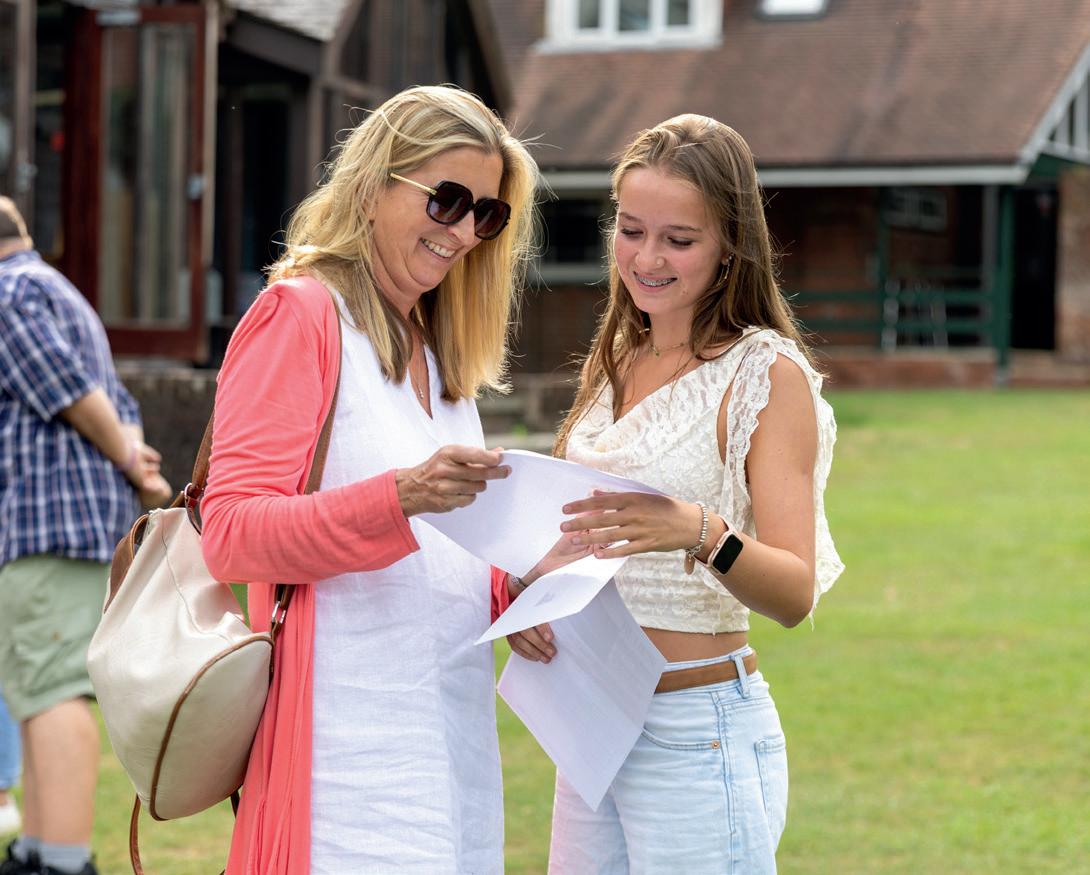
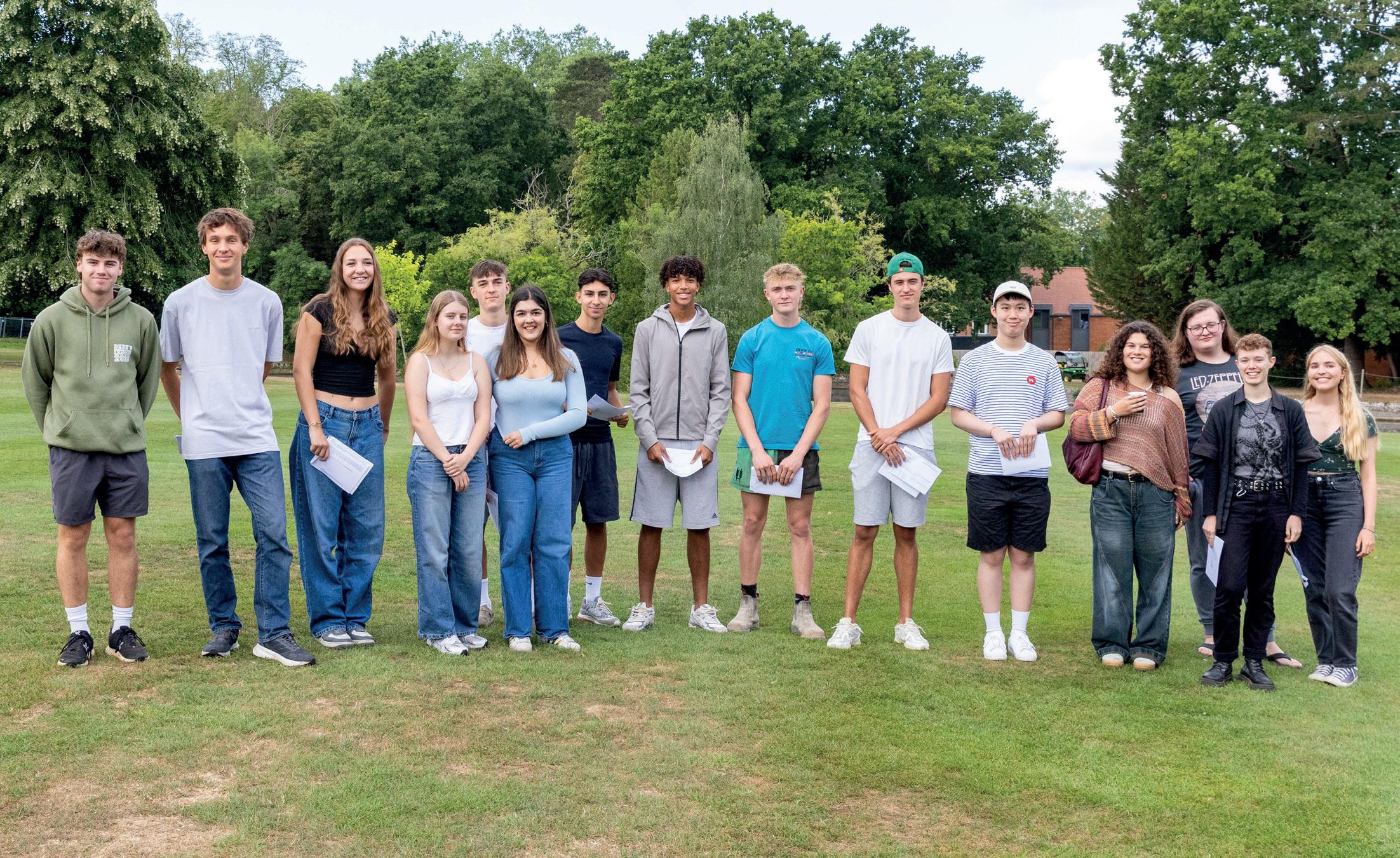
IfdoingASexams,start
revisingstraight away
strongStart in the first two weeks
Get work done at school so you have less prep to do at home, throw yourself into stuff and don’t be worried about looking silly
Enjoyitas itgoesso quickly
Do subjects you enjoy and stay on top of your work
Takepartineverythingthingsyoucan.Don’tskipbecauseyoucan’t willbebotheredbecauseyou regretit.
Activelysearchfor helpassoonas youstrugglewith
something.
Build up good relationships with your teachers

Don’t waste frees, actually lock in from the start
Get involved with socials and extra-curricular activities

Find a good balance between hard work and fun in your own time
Behave around school like a 6th former
Manage your time well, haveaplanofwhen you're going to work on differentthingsinstead oftryingtocramitall into one session.
Dress well/ smart, so you set standards and are a good role model
Do the work at least a day before it's due!
Don't pick the subjects your parents want you to pick - pick what you want to do
Focusin lessons orelseyou'llfall behind
How to become a school/house prefect
Being a Prefect is more than just a title; it's an opportunity to shape your school community and develop vital leadership skills. For Lower Sixth students, the journey to becoming a prefect begins with demonstrating core values, active involvement in school life, and a commitment to making a real difference.
The foundation of any good prefect lies in four key values; Courage, Conscientiousness, Curiosity, Compassion. Begin to think about times you've shown these qualities in your everyday school life. These are the experiences you'll want to highlight. Being a regular face at school committee meetings is a great start, but to truly stand out, you need to be proactive. This means following up on actions, don't just discuss, do! Take the initiative to ensure that decisions made in meetings are actually put into practice. It also means driving change, Prefects aren't passive observers. They're keen to identify areas for improvement and actively work towards changes that will benefit the entire pupil body. Your ideas and energy can truly shape the school experience for everyone.
If you're aiming to be a House Prefect, mark your calendars for late November. This is when applications typically open. You'll typically be interviewed by your Hm, and sometimes even by a panel of current pupils. This is your chance to show how you embody those core values and your vision for your House.
For those aspiring to be School Prefects, the process is a little different. Your Hm will nominate pupils for these highly soughtafter roles. If you're nominated, prepare for interviews with members of Senior Management in March. These interviews are a significant step, and you'll also be given a specific task to complete, designed to assess your leadership potential and problem-solving skills.
Becoming a prefect is a challenging yet incredibly rewarding experience. It's an opportunity to develop your leadership, make a tangible difference, and leave a lasting legacy on your school. Start thinking now about how you can demonstrate those core values and get actively involved – your journey to becoming a prefect could begin sooner than you think!
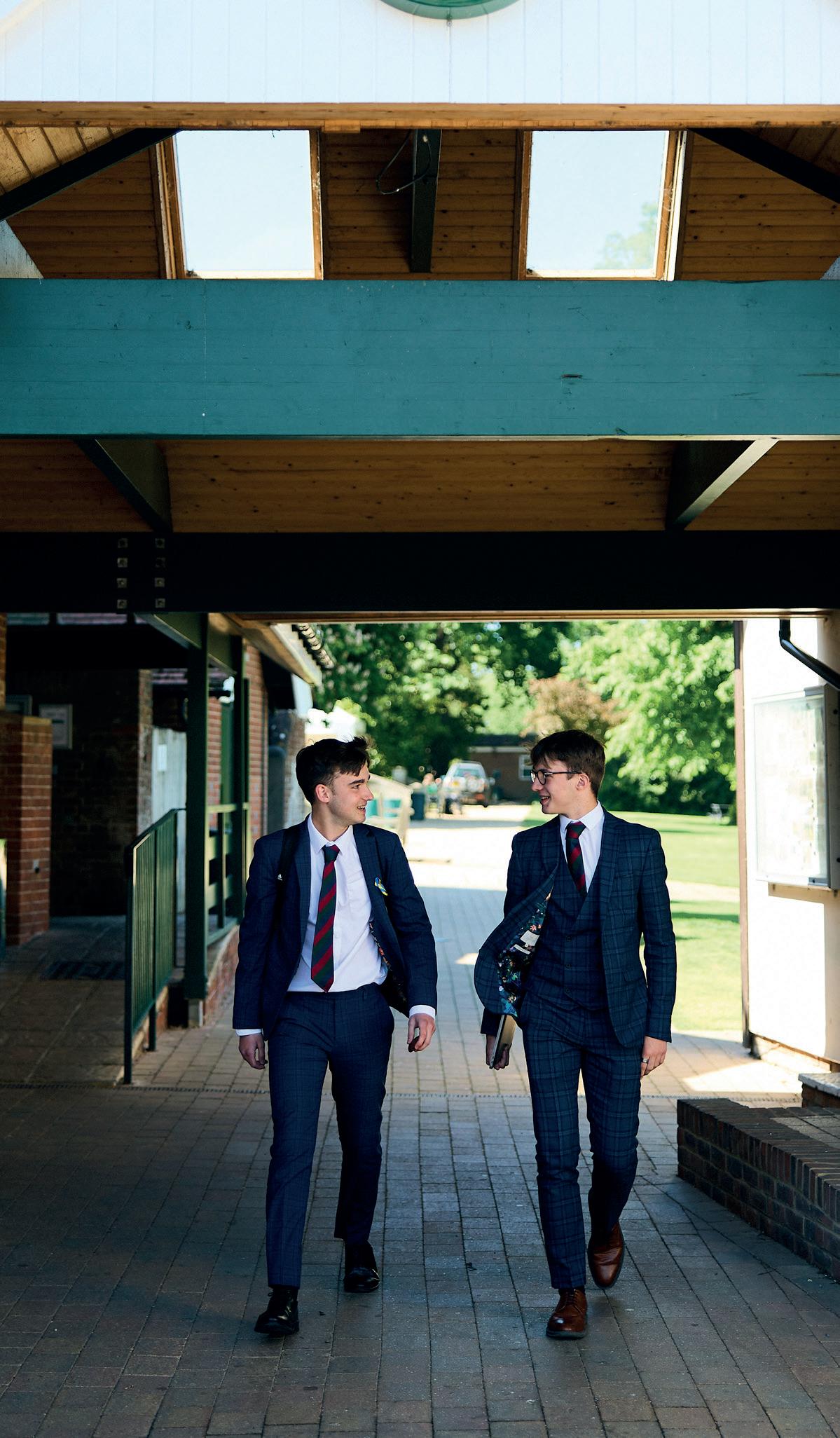
A-Level Subject Preparation
Art & Photography
The A Level Art Course is your opportunity to find your creative potential. Over a third of Creative Art Pupils go on to study a creative subject.
Take some time to look at the work of previous pupils to gain an idea of the standards we are aiming for here.
SUMMER REVISION TOPICS
Please see the ‘Preparation work’ at the end of this section for ideas. A strong Art, Photography or Ceramics pupil will always be thinking of ideas, sketching, taking images, and visiting exhibitions. That will be the best use of your summer.
In this video Mr Turner Explains HOW we mark your creative work and gives you an idea of the 4 key assessment criteria you will be marked on.
PRACTICE WORKSHEETS
Take the time to explore past pupils sketchbooks - it may give you ideas but also but will also give you a sense of how we step up from GCSE to A Level - Look at Exemplar Sketchbooks here
RECOMMENDED READING
12 Books on Thinking about Looking
The suggestion of Books, Documentaries and Podcasts are great for any serious artist of any age. If you don’t get a chance to look at them this summer, go back to them in the future - these are essential reading for visual thinkers.
RECOMMENDED ADDITIONAL READING
Some Books & Documentaries handpicked by the Art Departmenthttps://sites.google.com/bedes.org/art/books-documentaries
PREPARATION WORK
Should do:
• Take a Series of Photographs (a Minimum of 30) around a theme. For example Architecture, Portraits of Landscapes. A Strong photoshoot will prove useful in the first half of term.
• Visit at least One Exhibition see some suggestions here.
Could do:
• Create a still life drawing - a minimum of 30 Minutes. You could create a series of these.
• Carry a Camera & Sketchbook around with you at all times.
• Visit a number of exhibitions (not just a compulsory one).
• Read, watch or listen to one of the suggested books, documentaries or podcasts.
Biology
Welcome to A Level Biology! During the two years of the course you will study a wide range of topics from across the living world.
• Biological molecules
• Cells, viruses and reproduction of living things
• Experimental methods
• Energy for biological processes
• Microbiology and pathogens
• Modern genetics
Specification at a glance
SUMMER REVISION TOPICS
• Classification
• DNA and Protein Synthesis
• Heart and Circulation
• Enzymes
• Evolution
PRACTICE WORKSHEETS
This is a selection of questions that build on GCSE content but in an A Level style and context.
L6-incoming-A-level-biology-questions
L6 - Incoming - A Level Biology Mark Scheme
RECOMMENDED READING
Rosalind Franklin: The Dark Lady of DNA, (Maddox, B.)
The Selfish Gene, (Dawkins, R.)
The Descent of Men. (Jones, S.)
The Seven Daughters of Eve, (Sykes, B. )
Plants for People, (Lewington, A.)
The Red Queen, (Matt Ridley)
Entangled Life, (Merlin Sheldrake)
RECOMMENDED ADDITIONAL READING
Film - Icarus
Mini Series - Autopsy Life and Death - (Some caution needed)
Film -The Lazarus Effect
Film - Botany of Desire
Documentary - Project Nim
The Immortal Life of Henrietta Lacks Youtube channel visualising cool Biology
PREPARATION
WORK
Should do
• This is a selection of questions that build on GCSE content but in an A Level style and context. If there are topic areas you are stuck on then refer back to your GCSE resources or email nancy.morton-freeman@bedes.org for some help
• L6-incoming-A-level-biology-questions
Could do
• Explore the resources and material on our Bede’s BioWeb Bede’s BioWeb
Business Studies
Business Studies A Level provides learners with an insight into the inner workings of organisations, covering small independent start-ups right up to the strategic decision making process of multinationals.
The course covers all functional areas (Marketing, Finance, Human Resources and Operations) as well as looking into the wider issues such as the economy, the environment and the role that technology plays within firms.
SUMMER REVISION TOPICS
The A Level builds upon the topics taught at GCSE level. A clear understanding of the functional areas covered at GCSE will be of great value to anyone looking to study this course, but is not essential.
PRACTICE WORKSHEETS
A great starting point would be to read through these questions and plan out responses to them. 8 and 12 Mark Questions by Functional Areas
RECOMMENDED READING
• Business news stories using the BBC website. Found here
• Register with tutor 2u, a business studies website with presentations, videos and revision quizzes. Found here
• Review the syllabus. The A Level Business Studies specification can be found here
RECOMMENDED ADDITIONAL READING
Dragon’s Den and Shark Tank are excellent for building up one’s vocabulary and beginning to think about differentiation in competitive markets.
For a feature length film, the Founder (2016) comes recommended as a humorous take on the creation of McDonalds.
Other useful articles, podcasts and youtube sites as recommendations from staff can be found here suggested reading:
PREPARATION WORK
Should do:
• Complete the research activity that can be found here
Could do:
• Complete all activities found within the A Level preparation guide here
Ceramics
The A Level Art Course is your opportunity to find your creative potential. Over a 3rd of Creative Art Pupils go on to study a creative subject.
Take some time to look at the work of previous pupils to gain an idea of the standards we are aiming for here
SUMMER REVISION TOPICS
Please see the ‘Preparation work’ at the end of this section for ideas. A strong Art, Photography or Ceramics pupil will always be thinking of ideas, sketching, taking images, and visiting exhibitions. That will be the best use of your summer.
In this video Mr Turner Explains HOW we mark your creative work and gives you an idea of the 4 key assessment criteria you will be marked on.
PRACTICE WORKSHEETS
Take the time to explore past pupils sketchbooks - it may give you ideas but also but will also give you a sense of how we step up from GCSE to A Level - Look at Exemplar Sketchbooks here
RECOMMENDED READING
• 12 Books on Thinking about Looking
The suggestion of Books, Documentaries and Podcasts are great for any serious artist of any age. If you don’t get a chance to look at them this summer, go back to them in the future - these are essential reading for visual thinkers.
RECOMMENDED ADDITIONAL READING
Some Books & Documentaries handpicked by the Art Departmenthttps://sites.google.com/bedes.org/art/books-documentaries
PREPARATION WORK
Should do:
• Take a Series of Photographs (a Minimum of 30) around a theme. For example Architecture, Portraits of Landscapes. A Strong photoshoot will prove useful in the first half of term.
• Visit at least One Exhibition see some suggestions here.
Could do:
• Create a still life drawing - a minimum of 30 Minutes. You could create a series of these.
• Carry a Camera & Sketchbook around with you at all times.
• Visit a number of exhibitions (not just a compulsory one).
• Read, watch or listen to one of the suggested books, documentaries or podcasts.
Chemistry
A level Chemistry studies the material world, and through chemistry we can describe and explain questions such as: “What happens when sugar dissolves in tea?”; “Why is mercury a liquid at room temperature?”; “How do we make plastics?”; “What can we do about global warming?”; “How and why will I be affected if oil runs out?”. The A level Chemistry course covers a wide variety of basic concepts such as the structure of the atom; the interaction of matter and energy; how to control reactions; patterns in the Periodic Table; understanding carbon-based molecules.
SUMMER REVISION TOPICS
Atomic structure, Bonding and the properties of matter, Quantitative chemistry, Energy changes.
PRACTICE WORKSHEETS
Basic competencies in chemistry
RECOMMENDED READING
Periodic Tales: The Curious Lives of the Elements This book covers the chemical elements, where they come from and how they are used. There are loads of fascinating insights into uses for chemicals you would have never even thought about. The Science of everyday life: Why Teapots Dribble, Toast Burns and Light Bulbs Shine The title says it all really, lots of interesting stuff about the things around your home
One of our crowning scientific achievements is also a treasure trove of passion, adventure, betrayal and obsession. The Disappearing Spoon follows the elements, their parts in human history, finance, mythology, conflict, the arts, medicine and the lives of the (frequently) mad scientists who discovered them. Bad Science Here Ben Goldacre takes apart anyone who published bad / misleading or dodgy science – this book will make you think about everything the advertising industry tries to sell you by making it sound ‘sciencey’.
The Joy of Chemistry introduces readers to the beauty and magic of chemistry. Starting with a bang a fantastic bottle rocket made from everyday objects found around the house the authors present the essential concepts of chemistry, from atomic structure to the vibrant universe of chemical reactions, using everyday experiences, friendly non-technical language, and hands-on demonstrations.
RECOMMENDED ADDITIONAL READING
MOVIES: The Human Experiment (2013)
A documentary that explores chemicals found in everyday household products.
An Inconvenient Truth (2006)
Al Gore, former presidential candidate campaigns to raise public awareness of the dangers of global warming and calls for immediate action to curb its destructive effects on the environment.
(See also: An Inconvenient Sequel, 2017)
Truth to Power: Bonni Cohen and Jon Shenk direct this documentary sequel which follows former United States Vice President Al Gore as he continues his fight against climate change. Travelling the world to deliver lectures and meet with global leaders in an attempt to convince them of the benefits of investing in renewable energy, Gore highlights the progress that has been made in tackling the issues surrounding climate change in the last ten years and discusses the many problems which still remain.
Erin Brokovich (2000) Based on a true story. An unemployed single mother becomes a legal assistant and almost single-handedly brings down a California power company accused of polluting a city’s water supply
The Insider (1999)
A research chemist comes under personal and professional attack when he decides to appear in a “60 Minutes” expose on Big Tobacco.
A Civil Action (1998) A tenacious lawyer takes on a case involving a major company responsible for causing several people to be diagnosed with leukemia due to the town’s water supply being contaminated, at the risk of bankrupting his firm and career.
PREPARATION WORK
Should do:
• Transition worksheet
Could do:
• AQA Introduction pack
Design & Technology
The A Level is based upon a two-year course for the teaching of the full A level, with examinations taking place in year 2 only and coursework submitted for A level at the end of year 2. The project undertaken in year 1 of the course is intended to support the teaching of skills and give experience of the practical application of the theory being taught. This project is not assessed as any part or final submission.
Maths skills now contribute to the overall qualification and, since Maths cannot be assessed in the coursework, it will be in the exam paper, representing 15% of the total paper marks.
SUMMER REVISION TOPICS
The A Level builds upon the topics taught at GCSE level and a clear understanding of the properties of materials, sustainability, design strategies amongst others covered at GCSE will be of great value to anyone looking to study this course.
PRACTICE WORKSHEETS
There are 42 worksheets covered in the GCSE course. 28 are based on the ‘Core’ theory, and 16 on ‘Timbers’, the specialist area we study.
RECOMMENDED READING
As the course is Edexcel, just like the GCSE, it would be a good idea to review a GCSE Design & Technology text book such as this revision guide
RECOMMENDED ADDITIONAL READING
A good starting point would be to look at mass production. One of the visits you would go on in the 6th form is to the Mini Plant at Cowley , Oxford. There is a brilliant video all about this, filmed in 2016 by the BBC. See attached link. MINI Factory - How is a MINI made?
PREPARATION WORK
Should do:
Start practicing CAD skills by using ‘Onshape’ or something similar lie Fusion 360 or Google Sketchup.
Could do:
Complete one or two past papers from GCSE
Drama
This dynamic and practical course allows pupils to explore theatre as a performer, director, and designer. They will delve into the process of creating original theatre through devising (Component 1), hone their performance skills with scripted texts (Component 2), and critically analyse play texts and live productions in a final written exam (Component 3). As part of the course pupils will study influential theatre practitioners and learn to interpret plays for a contemporary audience, developing skills in creativity, collaboration, and critical analysis.
There is only one written paper that pupils sit in the final season of summer examinations. The rest of the specification, a combination of practical performances and a single piece of coursework, is completed over the two year course of study.
SUMMER REVISION TOPICS
Summer Task: Component 2: Monologue Portfolio
1. You will find 3 contrasting monologues suitable for performance, choosing one of them for sharing at the beginning of the new term.
2. You will conduct background research to assist the development of your performance.
PRACTICE WORKSHEETS
Monologue Portfolio
RECOMMENDED READING
The Frantic Assembly Book of Devising Theatre
RECOMMENDED ADDITIONAL READING
Watch and review a selection of plays on https://www.dramaonlinelibrary.com/
PREPARATION WORK
Please see enclosed worksheets
Should do:
• Complete monologue portfolio
Could do:
• Watch and review a selection of plays on https://www.dramaonlinelibrary. com/
Economics
A Level Economics takes an in-depth look into how resources are allocated within an economy and tries to understand the motivations of consumers, firms and governments. It is relevant, fast moving and will give you the tools to be able to think critically and develop your own opinions about the world in which we live.
SUMMER REVISION TOPICS
The A Level builds upon the topics taught at GCSE level and a clear understanding of microeconomic and macroeconomic theory covered at GCSE will be of great value to anyone looking to study this course, but is not essential.
PRACTICE WORKSHEETS
A great starting point would be to complete GCSE Economics multiple choice papers and identify topics that challenge you and build up your vocabulary. Papers and mark schemes found here
RECOMMENDED READING
Any reading of the Business/ Economics pages will be of great value, with the BBC being a useful starting point here or here
RECOMMENDED ADDITIONAL READING
Other useful articles, podcasts and youtube sites as recommendations from staff can be found here suggested reading
PREPARATION WORK
Should do:
• Complete the GCSE multiple choice questions and mark them. Papers and mark schemes found here
Could do:
• Attempt to complete and mark some A Level multiple choice question papers found here
English
A-level English allows pupils to explore the best in canonical and contemporary literature, to study plays, poems and novels which have shaped the language and inspired readers for generations. As well as appreciating the words of others, our pupils learn to express their own ideas with more clarity, confidence and flair They become better critical thinkers, more adept in debate and more
SUMMER REVISION TOPICS
Much of the content will be new from GCSE, though we will extend on skills already developed. The following things would be useful….
See a live Shakespeare play at the Globe or other theatres. For pupils really looking to get ahead, listening to Oxford University’s Emma Smith on the play you see would be very useful. You will study a Shakespeare play, so considering his language and context would be time well spent.
2.Listening to a poetry podcast on a regular basis would help hone your skills of literary analysis. Podcasts we like include: The New Yorker Poetry Podcast, Versify: the Poetry Podcast, and Poem Talk.
PRACTICE WORKSHEETS
To help you with the prep task (see should and could do), we recommend reading a summary of Italo Calvino’s writing on ‘What Makes A Classic’
This gets pupils thinking about why some books are studied as ‘literature’ whilst others rarely survive beyond the lives of their authors, and introduces the concept of the ‘literary canon’ - a contentious idea that pupils will discuss when they arrive
RECOMMENDED READING
Whilst worksheets might be reductive, there are two texts which are a superb place to begin on more advanced analysis of literature and literary history: Peck and Coyle’s ‘Practical Criticism’ and David Lodge’s ‘The Art of Fiction’.
RECOMMENDED ADDITIONAL READING
We issue a summer reading list (see should do) but we would also recommend the BBC’s long running academic series In Our Time, especially on Shakespeare, an regular reading of a broadsheet newspaper’s culture section each weekend. Reading any of the following, even in part, will broaden both your awareness of the arts, theatre and literature, but also how these things are written about. As a starting point, we’d suggest any of the following:
The Guardian review, published each Saturday in print or online
The Telegraph Review - in print or online with subscription
The Times Weekend section and The Sunday Times Culture section - online and in print.
PREPARATION WORK
Should do:
• We expect all pupils to read two novels over the summer break in line with our specific holiday work task - ‘what is a classic?’. See this letter for details. Please contact: matthew.oliver@bedes.org if you have any questions or want clarification on the set tasks.
Could do:
• See a Shakespeare production at the Globe or another theatre.
French
Bienvenue! Welcome to A Level French! You will be studying the AQA specification and will learn about social issues and trends in French speaking countries and political and artistic culture of these countries with a view to becoming fluent in these topics. You will also continue to work on your grammar and work on two cultural topics (one book and one film).
SUMMER REVISION TOPICS
The A Level course builds on your knowledge of the language gained during GCSE. Reviewing and practising all of the grammar seen at GCSE is therefore paramount and so is keeping your French comprehension going via listening and reading.
PRACTICE WORKSHEETS
You must make sure to revise and practise the GCSE grammar topics by accessing revision resources and exercises (corrected online) here: Grammar on Languages online
RECOMMENDED READING
You should start getting used to listening to and reading the French headlines by accessing:
• Read articles on 1 jour 1 actu
• Listen to News in slow French
RECOMMENDED ADDITIONAL READING
Listening to music, watching films, series and documentaries are great and fun ways to continue practising your language skills and to learn new language.
PREPARATION WORK
Should do:
• Revise GCSE grammar using this link: Grammar on Languages online
Could do:
• Listen to and read French using these links: Read articles on 1 jour 1 actu
• Listen to News in slow French
• Listen to and watch French music, tv, films via Spotify, Netflix etc.
Further Maths
Welcome to studying A-Level Further Mathematics.
The Further Maths course is a one year course taken during Upper 6th once you have completed the A Level Maths course in Lower 6th. You’ll study 50% Pure Mathematics, 50% Statistics & Mechanics.
In your first week studying A-Level Mathematics all pupils will do a baseline test. This is to assess their algebraic ability. The worksheets in the guide are designed to help you prepare for this.
We look forward to welcoming you in September.
SUMMER REVISION TOPICS
Algebra is the most important topic to start the course.
• In Pure pupils should be able to:
• Factorise & Solve Quadratics
• Expand Indices
• Solve all types of linear equations
• Solve Simultaneous Equations incl quadratic
• Simplify Surds
• Functions incl transformations
• Understand basic calculus
In Statistics, pupils should be able to
• Find the mean, mode, median
• Use Cumulative Frequency Graphs
• Understand probability Tree Diagrams as well as Histograms
PRACTICE WORKSHEETS
For all of the above topics there is a worksheet & answers in the link below:
https://drive.google.com/drive/folders/1gUT_bHInf8PUuQUlsYm4CFEUro5DoJMn
RECOMMENDED READING
The following are books that are both enjoyable and would be of interest to a 16-year-old studying Mathematics:
• The Simpsons and Their Mathematical Secrets
• The man who loved only numbers
• Fermat’s Last Theorem
RECOMMENDED ADDITIONAL READING
We would recommend the Plus Maths website below as this contains interesting topics and articles in Maths https://plus.maths.org/content/
For those considering studying Maths at a higher level, the UKMT senior maths challenge is a competition that pupils will enter in October and it would be worthwhile practising these questions https://ukmt.org.uk/senior-challenges/senior-mathematical-challenge
PREPARATION WORK
Should do:
• Complete this practice paper
Could do:
• Work on the topics listed in the essential topic list for anything they might not have covered at GCSE level
Geography
Welcome to A Level Geography! We study the AQA specification. The units include:
• Global Systems and Global Governance
• Changing Places
• Contemporary Urban Environments
• Water and Carbon Cycles
• Coastal Systems
• Natural Hazards
SUMMER REVISION TOPICS
Coasts and Natural Hazards - these whole units at GCSE are covered again at much greater depth at A Level
Urban environments - remind yourself about global patterns of urban change from Urban Issues and Challenges at GCSE
PRACTICE WORKSHEETS
Read through:
Essential notes on Contemporary Urban Environments
Essentials on Water and Carbon Cycles
RECOMMENDED READING
Prisoners of Geography - Tim Marshall
Globalisation: A Very Short Introduction - Manfred Steger
Current affairs
Geographical magazine
RECOMMENDED ADDITIONAL
READING
TedTalks: Our future in cities
PREPARATION WORK
Should do:
• Review key terms from GCSE Geography
Could do:
• Watch TedTalks: Our future in cities
Read through:
• Essential notes on Contemporary Urban Environments
• Essentials on Water and Carbon Cycles
Revisit all lesson slides and resources from Coastal Landscapes and Natural Hazards units from GCSE
German
Willkommen! Welcome to A Level German! You will be studying the AQA Specification and will learn about social issues and trends in German speaking countries and political and artistic culture of these countries with a view to becoming fluent in these topics. You will also continue to work on your grammar and work on two cultural topics (one book and one film).
SUMMER REVISION TOPICS
The A Level course builds on your knowledge of the language gained during GCSE. Reviewing and practising all of the grammar seen at GCSE is therefore paramount and so is keeping your German comprehension going via listening and reading.
PRACTICE WORKSHEETS
You must make sure to revise and practise the GCSE grammar topics by accessing revision resources and exercises (corrected online) here: Grammar on languages online
RECOMMENDED READING
You should start getting used to listening to and reading the German headlines by accessing:
Listen to and read simplified articles
News in slow German
RECOMMENDED ADDITIONAL READING
Listening to music, watching films, series and documentaries are great and fun ways to continue practising your language skills and to learn new language.
PREPARATION WORK
Should do:
• Revise GCSE grammar using this link: Grammar on languages online
Could do:
• Listen to and read German using these links:
• Listen to and read simplified articles
• News in slow German
• Listen to and watch German music, tv, films via Spotify, Netflix etc.
Government & Politics
Welcome to A Level Politics! Over the next two years you will be looking at aspects of UK Politics and US Politics, and making comparisons between the two systems. You will also study a range of political ideologies: conservatism, liberalism, socialism and feminism. You will complete three exams (UK Politics, US Politics & Political Ideologies) at the end of Y13.
The AQA Politics specification can be found here.
SUMMER REVISION TOPICS
• It would be helpful to build up a core knowledge of:
• the mechanics of the UK Parliament (eg role of the Prime Minister, the House of Commons & House of Lords, position of the Supreme Court etc)
• the US Congress (eg role of the President, the Senate and House, position of the Supreme Court)
• an understanding of key terms such as the Executive, Legislature and Judiciary, and the different powers that they have (both UK and US)
PRACTICE WORKSHEETS
Visit Pre-Chewed Politics using the login: politics@bedes.org and password: Lovepolitics21 - use this to access a range of video resources
• Create a political news diary during the summer - with a UK general election in July and the US Presidential election in November there should be plenty happening!
• Access Seneca learning (pitched at Edexcel, however the core content is the same for AQA)
RECOMMENDED READING
• How Westminster works… and why it doesn’t - Ian Dunt
• Democracy wakening: Notes on the State of America - Heather Cox Richardson
RECOMMENDED ADDITIONAL READING
UK Parliament website
White House website
Congress website
There are a range of UK and US news corporations that offer different perspectives on politics, in both print and online
PREPARATION WORK
Should do
• Complete the Politics news diary
• Access Pre-Chewed Politics
Could do
• Build up your awareness of the key terminology of UK Parliament and US Congress using the range of resources provided
History
Welcome to A Level History - we study the OCR specification, covering the following units:
• Y107 England 1547-1603: late Tudors
• Y219 Russia 1894-1941
• Y319 Civil rights in the USA 1865-1992
You will also complete a ‘topic based essay’ (NEA) worth 20% of the overall grade.
SUMMER REVISION TOPICS
• For Y319 Civil rights in the USA you will need to prepare for our study of African Americans and the Reconstruction era
• For Y107 Late Tudors you will need to look at the crisis after the death of Henry VIII caused by the minority of his son, Edward VI, who was nine when he became King
PRACTICE WORKSHEETS
• For Y319 work through this series of resources covering the Reconstruction era - create a mindmap looking at the impact of Reconstruction on African American civil rights - both positive and negative
• For Y107 read through this resource on the children of Henry VIII - and watch this documentary about the life of Edward VI - make notes on the challenges he faced during his short reign
RECOMMENDED READING
• Reconstruction: America’s unfinished revolution - Eric Foner
• Children of England: The Heirs of King Henry VIII - Alison Weir
RECOMMENDED ADDITIONAL READING
• Listen to the Audiopi revision podcasts covering Y319 Civil rights in the USA, particularly episodes 3 and 18 (first half)
• login - bedes@audiopi.co.uk; password - BedesHistory2021#
• Listen to the relevant Late Tudor podcasts
PREPARATION WORK
Should do:
• Complete the mindmap on the Reconstruction era
• Complete the notes on Edward VI’s short reign
Could do:
• Research and build-up a range of different resources covering the three exam units
Maths
Welcome to studying A-Level Mathematics. During the two years of the course, you’ll study 60% Pure Mathematics, 20% Statistics and 20% Mechanics. At the end of the Lower 6th we will be sitting an AS-Level examination in Pure & Statistics.
In your first week studying A-Level Mathematics all pupils will do a baseline test. This is to assess their algebraic ability. The worksheets in the guide are designed to help you prepare for this.
We look forward to welcoming you in September.
SUMMER REVISION TOPICS
Algebra is the most important topic to start the course.
In Pure pupils should be able to:
• Factorise & Solve Quadratics
• Expand Indices
• Solve all types of linear equations
• Solve Simultaneous Equations
• Simplify Surds
• Understand Function Notation
• Understand basic calculus
In Statistics, pupils should be able to
• Find the mean, mode, median
• Use Cumulative Frequency Graphs
• Understand probability Tree Diagrams as well as Histograms
PRACTICE WORKSHEETS
For all of the above topics there is a worksheet & answers in the link below:
Worksheets
RECOMMENDED READING
The following are books that are both enjoyable and would be of interest to a 16-year-old studying Mathematics:
• The Simpsons and Their Mathematical Secrets
• The man who loved only numbers
• Fermat’s Last Theorem
RECOMMENDED ADDITIONAL READING
We would recommend the Plus Maths website below as this contains interesting topics and articles in Maths https://plus.maths.org/content/
For those considering studying Maths at a higher level, the UKMT senior maths challenge is a competition that pupils will enter in October and it would be worthwhile practising these questions https://ukmt.org.uk/senior-challenges/senior-mathematical-challenge
PREPARATION WORK
Should do
They should also complete these practice papers for the baseline test
Could do
Complete the 2nd practice paper for the test
Media
Welcome to studying A-Level Media Studies..
During the two years of the course, you’ll study 50% Media Theory and 50% Media Practice. At the end of the Lower 6th we will be sitting an AS-Level examination.
SUMMER REVISION TOPICS
Film and Internet Studies are the most important parts of the course. You will need to be confident in the following areas
• Representation
• Media Language
• Genre
• Narrative
• Media Industries
PRACTICE WORKSHEETS
This link will take you to an archive of example work that has been completed by previous AS and A2 pupils. It gives you a good overview of the sort of work that you will be doing.
RECOMMENDED READING
Look at the Media section of The Guardian website
Read Media Studies, a Graphic Guide
RECOMMENDED ADDITIONAL READING
Watch as many films as possible! Try to go outside your comfort zone and watch foreign films, indie films and films that are in different genres.
Watch ‘The Social Dilemma’ on Netflix
Watch “Inside’ by Bo Burnham on Netflix.
Watch ‘Black Mirror’ on Netflix
PREPARATION WORK
Should do:
• Watch as many varied films and television drama as possible
Could do:
• Complete an 800 word review of the best film or tv drama you have watched in the last 6 months.
Music
Welcome to A-Level Music. A-Level musicians study the musical elements and their interdependence, musical contexts and musical language. Learners will choose a combination of performing (in the form of a recital), composing and listening and appraising. The listening and appraising elements comprise an in-depth analysis of the instrumental music of Haydn, Mozart and Beethoven; Popular Song: Blues, Jazz, Swing and Big Band; Programme Music 1820 - 1910, and Innovations in Music 1900 to the present day.
SUMMER REVISION TOPICS
Welcome to A-Level Music. A-Level musicians study the musical elements and their interdependence, musical contexts and musical language. Learners will choose a combination of performing (in the form of a recital), composing and listening and appraising. The listening and appraising elements comprise an in-depth analysis of the instrumental music of Haydn, Mozart and Beethoven; Popular Song: Blues, Jazz, Swing and Big Band; Programme Music 1820 - 1910, and Innovations in Music 1900 to the present day.
• Learners should consolidate their listening of concertos, especially those of Classical composers such as Haydn, Mozart and Beethoven.
• Lots of practice of your instrument over the summer is essential - keep yourself fully ready for the rigours of A-Level Music performance!
PRACTICE WORKSHEETS
N/A
RECOMMENDED READING
These are some books, available through Amazon or Abe Books (or can be purchased elsewhere), as inspiration and a starting point:
• Music in the Classic Period by Reinhard Pauly
• Modern Music And After, Paul Griffiths
• History of Music, Roy Bennett
• A History of Western Music, by Burkholder, Grout & Palisca
RECOMMENDED ADDITIONAL READING
• Music Matters, BBC Radio 3
• Composer of the Week, BBC Radio 3
• Record Review, BBC Radio 3
• Composer Rooms, BBC Radio 3
Listening to Jazz, big band and swing music from the 1920s onwards.
Any classical music podcast to widen thought and insight, would be invaluable.
PREPARATION WORK
Should do:
• Keep practising your instrument/singing
• Listen to lots of music
• Some music theory would be really helpful - Grade 5 and above
Could do:
• Engage with some of the resources provided in this guide
• Go to concerts/gigs as much as possible - widen your horizons on Classical concerts in the south east of the UK as well as jazz gigs, if possible, too!
Philosophy
Welcome to A Level Philosophy. We study the AQA specification which consists of four units:
• Epistemology
• Moral philosophy
• Metaphysics of God
• Metaphysics of Mind
The focus of the A level is on understanding, applying and critiquing various philosophical arguments and theories.
SUMMER REVISION TOPICS
Don’t panic if you haven’t taken GCSE Religious Studies.
You might find it helpful, however, to revisit any work you did on arguments for and against the existence of God* and on different beliefs about the value of life.**
* On the AQA Religious Studies A specification, this would be Theme C.
**On the AQA Religious Studies A specification, this would be Theme B.
PRACTICE WORKSHEETS
They are not worksheets per se, but you might find the introductory documents here helpful. They were created by the Royal Institute of Philosophy (RIP) to give a basic overview of each unit of the course.
Pay particular attention to Epistemology and Moral Philosophy, as those are the units which are studied in the Lower Sixth.
RECOMMENDED READING
For an overview of key points of philosophical thinking: McKay’s Reasons, Explanations and Decisions.
For an short and opinionated introduction to some major topics in philosophy, as well as an exemplar of philosophical writing: Russell’s The Problems of Philosophy.
For those who feel exceptionally keen, the following two introductions give a very detailed introduction to the units studies in the Lower Sixth:*
• Deigh’s An Introduction to Ethics
• Lemos’ An Introduction to Epistemology
*Those who wish to read these should have read the RIP introductions in the previous box first.
RECOMMENDED ADDITIONAL READING
The archive of philosophy episodes of the In Our Time podcast is a treasure trove.
Here is a list of feature films recommended by some well-known professional philosophers.
PREPARATION WORK
Should do:
• Read pages 17-22 of the of the Moral Philosophy RIP introduction and answer questions 8, 9 and 10 on page 23
• Read pages 16-20 of the Epistemology RIP introduction and answer questions 1-4 on page 26.
Could do:
• Read the remainder of the two RIP introductions linked above.
Physics
In A-level Physics you will return to some concepts familiar from GCSE, but you will study them at a much greater depth, allowing you a more satisfying insight into the fundamental laws that govern the behaviour of the Universe. You will tackle mechanics, waves, electricity, gravity and nuclear physics in more detail, building your ability to solve complex problems that link the areas together. You will also be introduced to the weird and wonderful world of Particle Physics and quantum phenomena, meeting bizarre but theoretically approved ideas of how things work on the very smallest scales. In Year 13, your class will have the option to study one of five topics that will comprise just under a quarter of the A-level; the most popular choice in recent years has been Astrophysics.
SUMMER REVISION TOPICS
• Newton’s Laws of Motion
• Describing and calculating motion
• Work, energy and power
• Waves and their properties
• Electric circuits
PRACTICE WORKSHEETS
This set of exercises will help you to brush up on your handling of units, prefixes etc - essential basic skills that will make life at A-level much easier!
If you would like more…here is some more! This google form quiz builds on your GCSE knowledge.
PREPARATION WORK
Should do:
• Complete the exercises attached
Could do:
• Follow blogs (see previous column)
• Visit Science museums, planetariums etc when possible, e.g. the Natural History and Science Museums in London, the South Downs Planetarium in Chichester, Herstmonceux Science Centre
• Find and attend the meetings of a local astronomy society or group. Many of these offer free viewing sessions through telescopes.
RECOMMENDED READING
The CGP guide is visually attractive and very detailed.
RECOMMENDED ADDITIONAL READING
• Follow Physics in the news, e.g. from the BBC site
• Follow and read Physics blogs - there are many out there; here is one list,
Psychology
Welcome to Psychology!
At AS Level (year 1) pupils study four psychological approaches: • Biological • Cognitive • Learning • Social. Each approach is exemplified through 12 core studies, which illustrate a wide range of research methods, such as experiments, self-reports, case studies, observations. By exploring the relationship between the content of the study and the research methods, pupils will gain a broad understanding of how psychologists study experiences and behaviours, and why the research took place.
In the second year (A2), pupils will study Clinical Psychology, which considers the diagnostic criteria, symptoms, explanations and treatments for a variety of mental and behavioural disorders/conditions. Additionally, they will look at Health Psychology which focuses on the psychological factors that influence health, considers ways to measure and treat conditions such as pain and stress, and ways to influence behaviours around health and health choices.
Have a look at the CIE specification for more details on the topics
SUMMER REVISION TOPICS
N/A
PRACTICE WORKSHEETS
One of the most important aspects of Psychology is being able to read and interpret research into human behaviour. One thing we look at is whether it is practically and ethically ok. Have a look at this document to see if you can identify issues and propose solutions to a piece of psychological research
RECOMMENDED READING
Our Psychology website has an array of books that you can start to look atPsychology at Bede's
There is no required pre reading for the course - just enjoy reading some of the books that are psychology related.
RECOMMENDED ADDITIONAL READING
There are so many films, TV programmes and documentaries that explore the wonderful world of Psychology. A list can be found on our Psychology website here Psychology at Bede's.
PREPARATION WORK
Should do:
• Choose one TED talk to watch to start to consider some of the Psychological concepts the subject explores: TED talks Psychology
• Create a timeline of Psychology task here
Could do:
• Watch a brief Introduction to Psychology. There are some examples of Psychology in the real world. You could even write a few examples of where you have seen psychology in day to day life.
Spanish
Bienvenido! Welcome to A Level Spanish! You will be studying the AQA Specification and will learn about social issues and trends in Spanish speaking countries and political and artistic culture of these countries with a view to becoming fluent in these topics. You will also continue to work on your grammar and work on two cultural topics (one book and one film).
SUMMER REVISION TOPICS
The A Level course builds on your knowledge of the language gained during GCSE. Reviewing and practising all of the grammar seen at GCSE is therefore paramount and so is keeping your Spanish comprehension going via listening and reading.
PRACTICE WORKSHEETS
You must make sure to revise and practise the GCSE grammar topics by accessing revision resources and exercises (corrected online) here: Grammar exercises
RECOMMENDED READING
You should start getting used to listening to and reading the Spanish headlines by accessing:
Access resources here News in slow Spanish
RECOMMENDED ADDITIONAL READING
Listening to music, watching films, series and documentaries are great and fun ways to continue practising your language skills and to learn new language.
PREPARATION WORK
Should do:
• Revise GCSE grammar using this link: Grammar exercises
• Could do:
• Listen to and read Spanish using these links:
• Access resources here
• News in slow Spanish
• Listen to and watch Spanish music, tv, films via Spotify, Netflix etc.
BTEC Subject Preparation
Animal Management
The Pearson BTEC Level 3 in Animal Management is a vocational qualification designed for individuals who are interested in pursuing a career in animal care and management.
This qualification is aimed at providing pupils with the necessary knowledge, skills, and understanding to work in the animal management sector or to progress to higher education in related fields.
SUMMER REVISION TOPICS
• Biology basics – cells, genetics, body systems (circulatory, digestive, respiratory, skeletal).
• Animal welfare – Animal Welfare Act (2006), Five Freedoms, signs of good/ poor health.
• Nutrition – key nutrients, herbivore/carnivore/omnivore diets.
• Animal care – safe handling, housing needs, hygiene, biosecurity.
• Conservation & ecology – food chains, habitats, threats to biodiversity.
• Study skills – simple maths for science (ratios, averages), interpreting graphs, research and note-taking.
PRACTICE WORKSHEETS
Preparing for a BTEC Level 3 in Animal Management can be greatly enhanced by engaging with these resources that will provide a solid foundation in key topics and help you gain a better understanding of animal care and management. Here are some recommended online resources:
RSPCA (Royal Society for the Prevention of Cruelty to Animals)
https://www.rspca.org.uk/
Their website offers valuable resources on animal welfare, care guidelines, and legislation.
Animal Behaviour (Journal)
Features research articles on animal behaviour, which is crucial for understanding how animals interact with their environment and each other. https://www.sciencedirect.com/journal/animal-behaviour
British Veterinary Association (BVA)
Provides news, research, and resources for those interested in veterinary science and animal health.
https://www.bva.co.uk/
RECOMMENDED READING
Books available from the school library: "Animal Biology and Care" by Sue Dallas, Emily Jewell, and Peter Barratt
This book covers essential topics in animal biology, care, and health, providing a comprehensive introduction to the subject.
"Introduction to Animal Science" by W. Stephen Damron
A broad overview of animal science, including animal physiology, nutrition, breeding, and behaviour.
"Animal Husbandry Regained: The Place of Farm Animals in Sustainable Agriculture" by John Webster.
RECOMMENDED ADDITIONAL READING
Documentaries and TV Programs
"Planet Earth" and "Blue Planet" series by BBC: These provide insights into animal behaviour and habitats.
"The Secret Life of the Zoo": Offers a behind-the-scenes look at zoo management and animal care.
By engaging with these resources, you'll gain a well-rounded understanding of animal management topics, which will be beneficial as you begin your BTEC Level 3 in Animal Management.
PREPARATION WORK
Should do:
• Check out the online resources provided
Could do:
• Take out and read some of the suggested texts from the library.
Business
The BTEC Business course provide you with the theoretical knowledge and practical understanding of the business sector. You will explore a range of topics such as personal and business finance, recruitment and selection and will also have the opportunity develop and execute your own marketing campaign
SUMMER REVISION TOPICS
N/A
PRACTICE
N/A
WORKSHEETS
RECOMMENDED READING
What to expect:
• https://www.youtube.com/watch?v=jbM4a_4aSYo
• https://www.youtube.com/watch?v=5CRNo1wGkUA
RECOMMENDED ADDITIONAL READING
Some support and guidance on Developing a marketing Campaign for unit 2: https://www.youtube.com/playlist?list=PLp8BSCLLWBUBDGmL6PF60OkGn0pFvnfT
Some support and guidance on the Personal and Business Finance for unit 3: https://www.youtube.com/watch?v=bt-qJMZs99E
PREPARATION WORK
Should do:
• Familiarise yourself with the BTEC Business course specification or any introductory materials provided by the school to understand the key units.
• Start following current business news – pay attention to headlines about local companies, national industries, and even global economic trends. Think about what makes businesses successful or causes them to struggle.
Could do:
• Begin by exploring resources related to “Personal and Business Finance” as this is often a foundational unit in the course.
• Watch documentaries or read articles about different types of businesses, entrepreneurs, or specific industries (e.g., technology, retail, services) to gain a broader understanding of the business landscape.
• Consider what challenges and opportunities businesses face in today’s world.
Dance
Start researching Assignment brief F16 Task 2. Looking at different job opportunities within the industry relating to your specialism. Identify and explore 2 roles and how they relate to each other looking at contract types (freelance, paye, self employed).
Unit C8 - Creating Performance Material. 3 minute dance to the stimulusReflection. Research the stimulus and explore your options. Look at music that fits your concept.
SUMMER REVISION TOPICS
• Stay flexible and keep up with strength and conditioning.
• Start looking at different musicals and dance productions that are happening in London and across the UK.
• Research employment contracts within the performing arts industry
PRACTICE WORKSHEETS
N/A
RECOMMENDED READING
• www.whatsonstage.com
• www.thestage.co.uk
• https://www.equity.org.uk/
RECOMMENDED ADDITIONAL READING
Start following influential people from the industry on social media platforms.
PREPARATION WORK
Should do:
• Staying fit and exercising regularly to ensure you maintain strength and flexibility.
Could do:
• Use the internet to start following the websites given to engage in current industry issues.
Welcome to BTEC IT!
You will be studying the BTEC Level 3 National Foundation Diploma in Information Technology.
Designed for learners interested in an introduction to how businesses use IT to manage and share information with employees, partners, customers and the public in general.
This provides a great platform to take into higher education at university, not necessarily in IT, or to apply for jobs or apprenticeships in a wide range of fields.
SUMMER REVISION TOPICS
This course consists of 6 units over the 2 year period.
During your first year you will study:
• Unit 1: IT Systems (External exam)
• Unit 2: Databases (External Set task - 5 Hrs)
• Unit 3: Using Social Media in Business (Coursework)
PRACTICE WORKSHEETS
Whilst aimed at GCSE, this will provide you with useful information, especially if you did not take GCSE Computer Science.
https://www.knowitallninja.com/
An excellent website dedicated to BTEC. I will provide a license for you to access units 1 and 2. Send me an email (chris.betts@bedes.org) with your school email address and I will set you up.
RECOMMENDED READING Books
These will be provided electronically, but grab yourself a copy if possible and flick through over the summer.
• BTEC National Information Technology Revision Guide (Third Edition)
• Pearson BTEC National Level 3 Information Technology: Unit 1 (PG Online)
RECOMMENDED ADDITIONAL READING
https://www.bbc.co.uk/news/technology
This area of the BBC news website will provide you with up-to-date information on technology development
Preparation for learning to code in Python (Upper 6th)
https://www.sololearn.com/en/learn/courses/python-introduction
PREPARATION WORK
Should do:
• Check out the online resources provided
• Get one of the course books and start reading
Could do:
• Work through the excellent solo learn online tutorials to develop a knowledge of Python in preparation for the upper 6th
Marketing
The BTEC Marketing course provides you with the theoretical knowledge and practical understanding of the dynamic marketing sector. You will explore a range of topics such as principles of marketing, market research, digital promotion, and branding, and will also have the opportunity to develop and execute your own communications plan and plan and prepare for recruitment activities within the marketing industry.
SUMMER REVISION TOPICS
N/A
PRACTICE WORKSHEETS
N/A
RECOMMENDED READING
https://www.youtube.com/watch?v=5CRNo1wGkUA
RECOMMENDED ADDITIONAL READING
This you tube channel provides you with some marketing ideas and strategies on how to ‘Market’ your business
PREPARATION WORK
Should do:
• Check out any online introductory resources or course overviews provided by the school to familiarise yourself with the BTEC Marketing specification.
• Start paying attention to the marketing around you – look at adverts, social media campaigns, and brand messaging.
Could do:
• Begin looking at the resources for the “Principles of Marketing” unit, which is often covered early in the course.
• Watch a few marketing-related documentaries or TED Talks to get a feel for different aspects of the industry.
Media
Welcome to BTEC Media!
On the course you will study camera, lighting, audio and editing. You will learn about the importance of pre-production and get the chance to make a tv ad, a music video and a short film.
SUMMER REVISION TOPICS
Practical- Shoot lots of videos and take lots of photographs. You can also get ahead with editing via these very helpful Youtube tutorial videos
Watch a lot of films and tv, and use the web to research ‘behind the scenes’ to learn more about the production process.
PRACTICE WORKSHEETS
Look at our showreel and taster film here.
RECOMMENDED READING
Look at the Media section of The Guardian website
Read Media Studies, a Graphic Guide
RECOMMENDED ADDITIONAL READING
This Youtube channel has dozens of brilliant short films that look at various aspects of films. It is beautifully edited and really insightful into films and filmmakers.
PREPARATION WORK
Should do:
• Watch as many varied films and television drama as possible
Could do:
• Complete an 800 word review of the best film or tv drama you have watched in the last 6 months.
Music Performance
Welcome to BTEC Music! In this practical based course you will develop and grow as a performing musician. We will develop ensemble performance skills, solo performance skills as well as learning about applying various musical styles to a performance and composition. You will learn about studio techniques and how to incorporate those techniques into your work. You will learn about the Music Industry, its beginnings, its future, and the impact it’s had on society as a whole. We will be taking a deep dive into the inner workings of the music industry in the 21st century.
SUMMER REVISION TOPICS
• Performance - Keep practising your instrument/singing over the summer holidays.
• If you play piano/guitar then start looking at various pop/rock songs that you enjoy and get your fingers around the chords. Getting used to playing chords from a lead sheet will help speed up the process of learning songs which you will be doing a lot of on the course.
PRACTICE WORKSHEETS
N/A
RECOMMENDED READING
NME
London Jazz News
Pitchfork
Loudwire
RECOMMENDED ADDITIONAL READING
Listen to lots of music over the summer.
Try and listen to new artists and songs
Some useful Youtube channels:
Charles Cornell - interesting engaging perspectives on all music.
Foolish Frankie - Vlogs about the reality of being a working musician.
Adam Neely - interesting videos about music
12 Tone - Engaging videos about music theory.
Amy Winehouse Documentary:
The story of Amy Winehouse is a poignant look at immense talent, the pressures of fame, and the creative process. It highlights her incredible vocal abilities and songwriting.
Sound City
The legendary Sound City recording studio and a glimpse into an analog recording. It features interviews with countless iconic musicians and producers, sharing insights into classic albums and the magic of analog recording.
PREPARATION WORK
Should do:
• Keep practising your instrument/singing
• Listen to lots of music
• Come to the course in September with lots of ideas of songs you want to perform
Could do:
• Engage with some of the resources provided in this guide.
• Go to concerts/gigs and evaluate what you think was successful about them and what was less successful.
Psychology
Welcome to Psychology! The BTEC course overview can be found here. Alongside the essential unis, you will study Sports Psychology as the optional unit.
SUMMER REVISION TOPICS
N/A
PRACTICE WORKSHEETS
One of the most important aspects of Psychology is being able to read and interpret research into human behaviour. One thing we look at is whether it is practically and ethically ok. Have a look at this document to see if you can identify issues and propose solutions to a piece of psychological research
RECOMMENDED READING
Our Psychology website has an array of books that you can start to look atPsychology at Bedes
There is no required pre reading for the course - just enjoy reading some of the books that are psychology related.
RECOMMENDED ADDITIONAL READING
There are so many films, TV programmes and documentaries that explore the wonderful world of Psychology. A list can be found on our Psychology website here Psychology at Bedes
PREPARATION WORK
Should do:
• Review the Introduction to Applied Psychology Booklet (here)
Could do:
• Watch a brief Introduction to Psychology. There are some examples of Psychology in the real world. You could even write a few examples of where you have seen psychology in day to day life.
Sport
The Academic PE Department offers two courses at Bede’s within the Sixth form.. The BTEC Level 3 National Diploma in Sports Coaching and Development (equivalent to two A Level options) and the BTEC Level 3 National Extended Certificate in Sports Coaching (equivalent to one A Level option). The Diploma course is worth up to 112 UCAS points and the Extended Certificate is worth up to 56 UCAS points. Pupils are assessed continually throughout the course.
Universities widely respect both courses and the benefits it offers to pupils in terms of transferable skill sets. During the course, pupils will carry out research projects, use case studies to explore complex and unfamiliar situations, as well as demonstrate practical and technical skills using appropriate processes. Pupils will develop their academic writing skills throughout the course.
SUMMER REVISION TOPICS
N/A
PRACTICE WORKSHEETS
Essential topics from CNAT Sports Science and IGCSE PE include:
• Health & wellbeing
• Injuries & illnesses
• Methods of training
• Components of health and skill-related fitness
RECOMMENDED READING
Continue working on the Taster Day worksheets, as this is part of the C1.1 assignment task pupils will begin in September.
Reading around National Governing Body sports coaching courses. Read around the rules and laws of the game for your top three sports, and begin looking at isolated skills and progressive drills that could be applied in your three chosen sports. You must know the laws, rules and coaching points for 3 sports played at Bede’s (not including swimming), to deliver to pupils for BTEC Sport.
RECOMMENDED ADDITIONAL READING
It is essential due to the nature of the course that pupils undertake a series of observations of different sports coaches in preparation for their own application. These should be in your 3 chosen sports (offered at Bede’s), in preparation for delivering in September. Pupils would benefit from either shadowing or assisting a qualified sports coach for several sessions over the summer at their local sports. At least three observations of different coaches should be completed over the summer, in preparation for the C1.2 task in September.
PREPARATION WORK
Should do:
• Observe, shadow or team-teach under the supervision of a fully qualified sports coach to gain knowledge, understanding and skills necessary for BTEC Sport Coaching
• Purchase a whistle, and ensure they have Bede’s PE kit for all practical lessons
Could do:
• Begin to research National Governing Body sport coaching qualification courses for their top three sports (offered in core PE at Bede’s, except swimming)

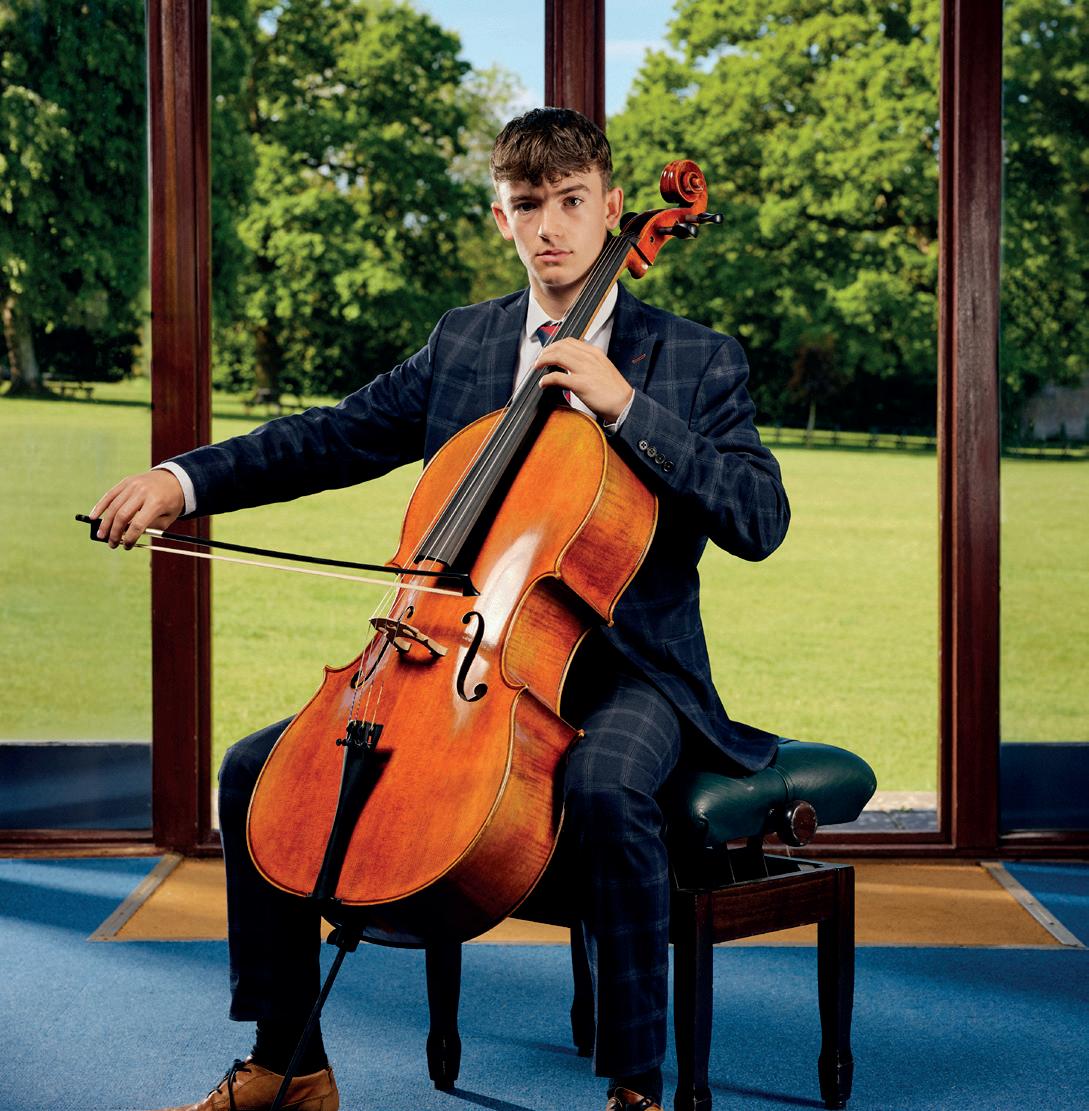
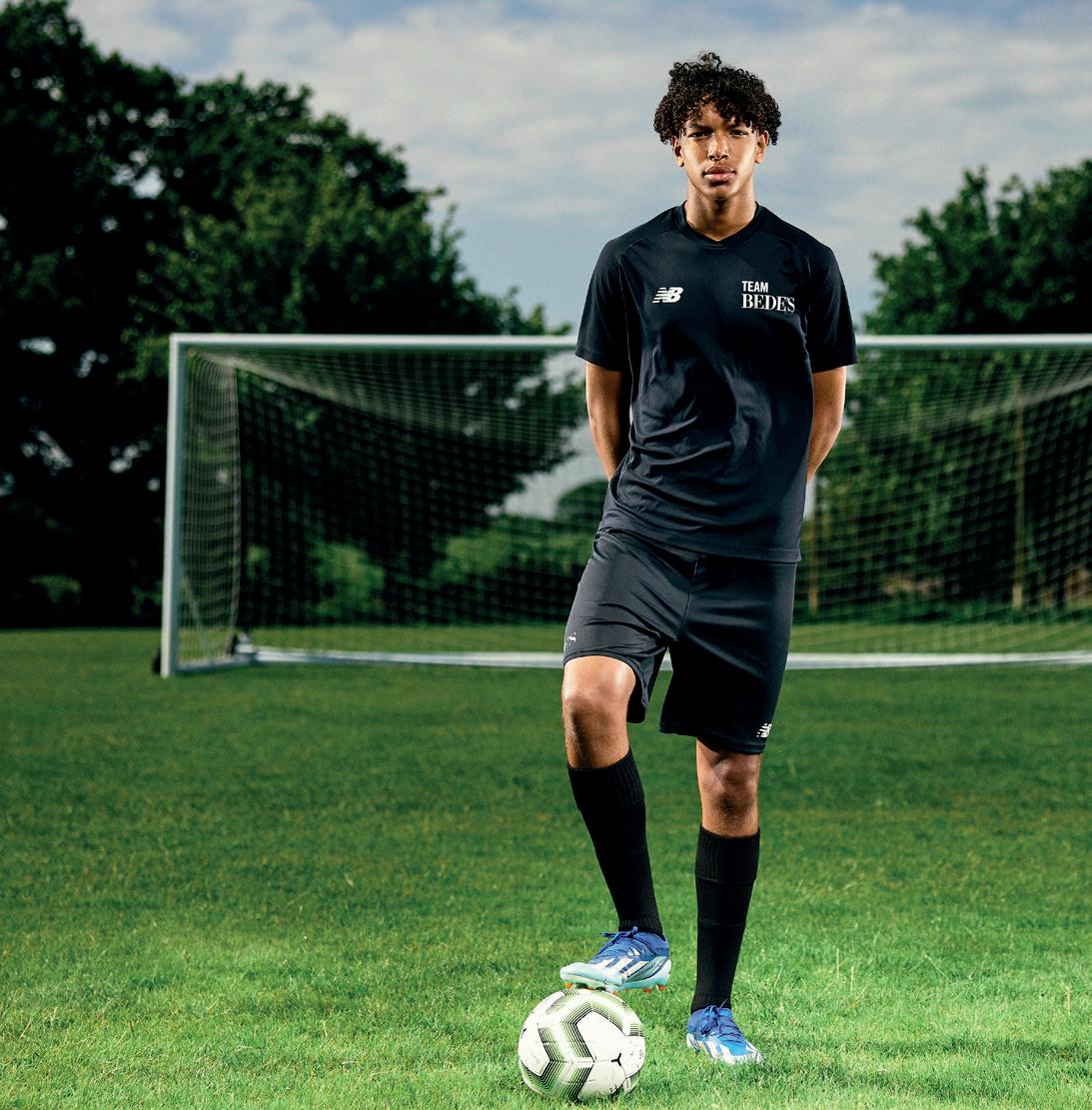
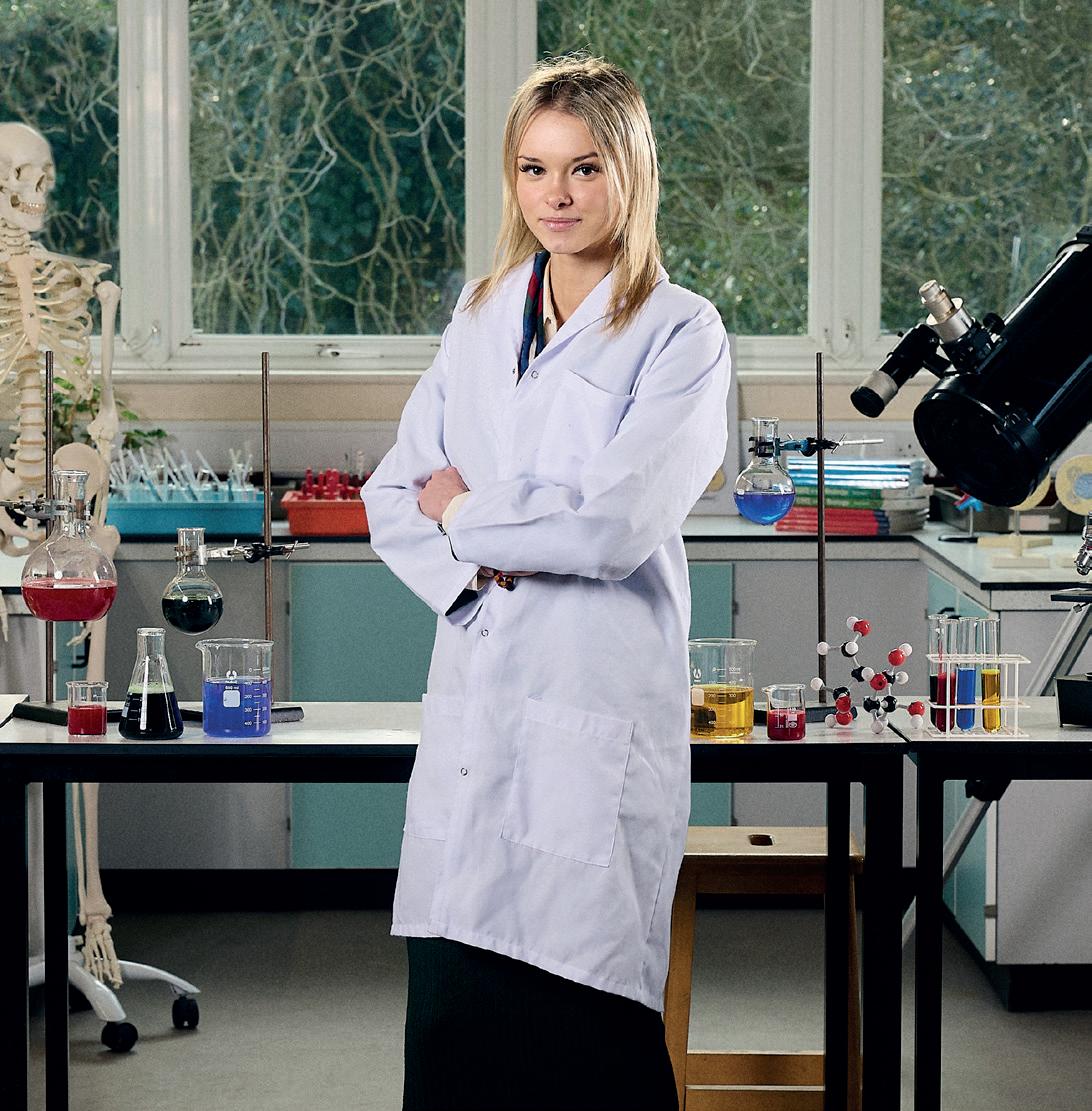
Heads of Department
DIRECTOR OF SIXTH FORM justin.sealey@bedes.org
HEAD OF YEAR 12 tameka.jackson@bedes.org
HEAD OF YEAR 13 jacob.adlam@bedes.org
ANIMAL MANAGEMENT paul.juniper@bedes.org
ART & CERAMICS jonathan.turner@bedes.org
BIOLOGY nancy.morton-freeman@bedes.org
BUSINESS & ECONOMICS barry.jackson@bedes.org
CHEMISTRY andreea.toma@bedes.org
LATIN pavlina.saoulidou@bedes.org
COMPUTER SCIENCE & IT chris.betts@bedes.org
DANCE (LEGAT ACADEMY) sherrie.pennington@bedes.org
DESIGN TECHNOLOGY nick.potter@bedes.org
DRAMA will.rennison@bedes.org
ENGLISH matthew.oliver@bedes.org
GEOGRAPHY robin.martin-jenkins@bedes.org
HISTORY & POLITICS james.whitaker@bedes.org
LEARNING ENHANCEMENT oliver.young@bedes.org
MATHEMATICS stavros.manos@bedes.org
MEDIA richard.williams@bedes.org
MODERN FOREIGN LANGUAGES veronique.ganivet@bedes.org
MUSIC robert.scamardella@bedes.org
PHOTOGRAPHY ema.excell@bedes.org
PSYCHOLOGY laurence.collier@bedes.org
PHYSICAL EDUCATION ali.rowsell@bedes.org
PHYSICS oli.froom@bedes.org
RELIGION & PHILOSOPHY sean.mcintosh@bedes.org
